

Community Blog
Keep up-to-date on postgraduate related issues with our quick reads written by students, postdocs, professors and industry leaders.
What Makes A Good PhD Supervisor?

- By Dr Harry Hothi
- August 12, 2020

A good PhD supervisor has a track record of supervising PhD students through to completion, has a strong publication record, is active in their research field, has sufficient time to provide adequate supervision, is genuinely interested in your project, can provide mentorship and has a supportive personality.
Introduction
The indicators that you’ll have the best chance of succeeding in your PhD project are multi-factorial. You’ll need to secure funding, find a research project that you’re interested in and is within your academic area of expertise, maybe even write your own research proposal, and find a good supervisor that will help guide you through PhD life.
As you research more into life as a doctoral student, you’ll appreciate that choosing a good supervisor is one of the most important factors that can influence the success of your project, and even If you complete your PhD at all. You need to find a good supervisory relationship with someone who has a genuine research interest in your project.
This page outlines the top qualities to look for as indicators of an ideal PhD supervisor. But before we get to that, we should be clear on precisely what the supervisor is there to do, and what they are not.
The Role of a PhD Supervisor
A PhD supervisor is there to guide you as you work through PhD life and help you make informed decisions about how you shape your PhD project. The key elements of their supervisory role include:
- To help ensure that you stay on schedule and maintain constant progress of your research so that you ultimately finish your PhD within your intended time frame, typically three to four years.
- To advise and guide you based on their knowledge and expertise in your subject area.
- To help you in the decision-making process as you design, prepare and execute your study design.
- To work with you as you analyse your raw data and begin to draw conclusions about key findings that are coming out of your research.
- To provide feedback and edits where necessary on your manuscripts and elements of your thesis writing.
- To encourage and motivate you and provide ongoing support as a mentor.
- To provide support at a human level, beyond just the academic challenges.
It’s important that you know from the outset what a supervisor isn’t there to do, so that your expectations of the PhDstudent-supervisor relationship are correct. A supervisor cannot and should not create your study design or tell you how you should run your experiments or help you write your thesis. Broadly speaking, you as a PhD student will create, develop and refine content for your thesis, and your supervisor will help you improve this content by providing you with continuous constructive feedback.
There’s a balance to be found here in what makes a good PhD supervisor, ranging from one extreme of providing very little support during a research project, to becoming too involved in the running of the project to the extent that it takes away from it being an independent body of work by the graduate student themselves. Ultimately, what makes a good supervisor is someone you can build a rapport with, who helps bring out the best in you to produce a well written, significant body of research that contributes novel findings to your subject area.
Read on to learn the key qualities you should consider when looking for a good PhD supervisor.
Qualities to Look For in A Good PhD Supervisor
1. a track record of successful phd student supervision.

A quick first check to gauge how good a prospective supervisor is is to find out how many students they’ve successfully supervised in the past; i.e. how many students have earned their PhD under their supervision. Ideally, you’d want to go one step further and find out:
- How many students they’ve supervised in total previously and of those, what percentage have gone onto gain their PhDs; however, this level of detail may not always be easy to find online. Most often though, a conversation with a potential supervisor and even their current or previous students should help you get an idea of this.
- What were the project titles and specifically the areas of research that they supervised on? Are these similar to your intended project or are they significantly different from the type of work performed in the academic’s lab in the past? Of the current students in the lab, are there any projects that could complement yours
- Did any of the previous PhD students publish the work of their doctoral research in peer-reviewed journals and present at conferences? It’s a great sign if they have, and in particular, if they’re named first authors in some or all of these publications.
This isn’t to say that a potential supervisor without a track record of PhD supervision is necessarily a bad fit, especially if the supervisor is relatively new to the position and is still establishing their research group. It is, however, reassuring if you know they have supervision experience in supporting students to successful PhD completion.
2. Is an Expert in their Field of Research
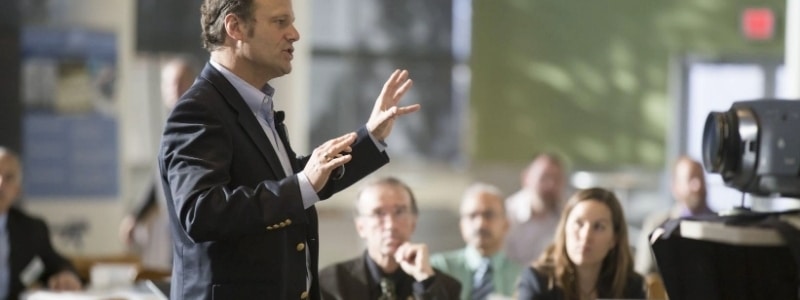
As a PhD candidate, you will want your supervisor to have a high level of research expertise within the field that your own research topic sits in. This expertise will be essential if they are to help guide you through your research and keep you on track to what is most novel and impactful to your research area.
Your supervisor doesn’t necessarily need to have all the answers to questions that arise in your specific PhD project, but should know enough to be able to have useful conversations about your research. It will be your responsibility to discover the answers to problems as they arise, and you should even expect to complete your PhD with a higher level of expertise about your project than your supervisor.
The best way to determine if your supervisor has the expertise to supervise you properly is to look at their publication track record. The things you need to look for are:
- How often do they publish papers in peer-reviewed journals, and are they still actively involved in new papers coming out in the research field?
- What type of journals have they published in? For example, are most papers in comparatively low impact factor journals, or do they have at least some in the ‘big’ journals within your field?
- How many citations do they have from their research? This can be a good indicator of the value that other researchgroups place on these publications; having 50 papers published that have been cited only 10 times may (but not always) suggest that this research is not directly relevant to the subject area or focus from other groups.
- How many co-authors has your potential supervisor published with? Many authors from different institutions is a good indicator of a vast collaborative professional network that could be useful to you.
There’re no hard metrics here as to how many papers or citations an individual needs to be considered an expert, and these numbers can vary considerably between different disciplines. Instead, it’s better to get a sense of where your potential supervisor’s track record sits in comparison to other researchers in the same field; remember that it would be unfair to directly compare the output of a new university lecturer with a well-established professor who has naturally led more research projects.
Equally, this exercise is a good way for you to better understand how interested your supervisor will be in your research; if you find that much of their research output is directly related to your PhD study, then it’s logical that your supervisor has a real interest here. While the opposite is not necessarily true, it’s understandable from a human perspective that a supervisor may be less interested in a project that doesn’t help to further their own research work, especially if they’re already very busy.
Two excellent resources to look up publications are Google Scholar and ResearchGate .
3. Has Enough Time to Provide Good PhD Supervision

This seems like an obvious point, but it’s worth emphasising: how smoothly your PhD goes and ultimately how successful it is, will largely be influenced by how much time your research supervisor has to provide guidance, constructive academic advice and mentorship. The fact that your supervisor is the world’s leading expert in your field becomes a moot point if they don’t have time to meet you.
A good PhD supervisor will take the time to meet with you regularly in person (ideally) or remotely and be reachable and responsive to questions as and when they arise (e.g. through email or video calling). As a student, you want to have a research environment where you know you can drop by your supervisors’ office for a quick chat, or that you’ll see them around the university regularly; chance encounters and corridor discussions are sometimes the most impactful when working through problems.
Unsurprisingly, however, most academics who are well-known experts in their field are also usually some of the busiest too. It’s common for established academic supervisors to have several commitments competing for their time. These can include teaching and supervising undergraduate students, masters students and post-docs, travelling to collaborator meetings or invited talks, managing the growth of their academic department or graduate school, sitting on advisory boards and writing grants for funding applications. Beware of the other obligations they may have and how this could impact your work relationship.
You’ll need to find a balance here to find a PhD supervisor who has the academic knowledge to support you, but also the time to do so; talking to their current and past students will help you get a sense of this. It’s also reassuring to know that your supervisor has a permanent position within your university and has no plans for a sabbatical during your time as a PhD researcher.
4. Is a Good Mentor with a Supportive Personality

A PhD project is an exercise in independently producing a substantial body of research work; the primary role of your supervisor should be to provide mentoring to help you achieve this. You want to have a supervisor with the necessary academic knowledge, but it is just as important to have a supportive supervisor who is actively willing and able to provide you constructive criticism on your work in a consistent manner. You’ll likely get a sense of their personality during your first few meetings with them when discussing your research proposal; if you feel there’s a disconnect between you as a PhD student and your potential supervisor at this stage, it’s better to decide on other options with different supervisors.
A good supervisor will help direct you towards the best outcomes in your PhD research when you reach crossroads. They will work with you to develop a structure for your thesis and encourage you to set deadlines to work to and push you to achieve these. A good mentor should be able to recognise when you need more support in a specific area, be it a technical academic hurdle or simply some guidance in developing efficient work patterns and routines, and have the communication skills to help you recognise and overcome them.
A good supervisor should share the same mindset as you about finishing your PhD within a reasonable time frame; in the UK this would be within three to four years as a full-time university student. Their encouragement should reflect this and (gently) push you to set and reach mini-milestones throughout your project to ensure you stay on track with progress. This is a great example of when a supportive personality and positive attitude is essential for you both to maintain a good professional relationship throughout a PhD. The ideal supervisor will bring out the best in you without becoming prescriptive in their guidance, allowing you the freedom to develop your own working style.
Finding a PhD has never been this easy – search for a PhD by keyword, location or academic area of interest.
To sum up, the qualities you should look for in a good PhD supervisor are that they have a strong understanding of your research field, demonstrated by regular and impactful publications, have a proven track record of PhD supervision, have the time to support you, and will do so by providing mentorship rather than being a ‘boss’.
As a final point, if you’re considering a research career after you finish your PhD journey, get a sense of if there may any research opportunities to continue as a postdoc with the supervisor if you so wanted.

Multistage sampling is a more complex form of cluster sampling for obtaining sample populations. Learn their pros and cons and how to undertake them.

The scope and delimitations of a thesis, dissertation or paper define the topic and boundaries of a research problem – learn how to form them.

This post explains the difference between the journal paper status of In Review and Under Review.
Join thousands of other students and stay up to date with the latest PhD programmes, funding opportunities and advice.

Browse PhDs Now

Being a new graduate teaching assistant can be a scary but rewarding undertaking – our 7 tips will help make your teaching journey as smooth as possible.

The purpose of research is to enhance society by advancing knowledge through developing scientific theories, concepts and ideas – find out more on what this involves.
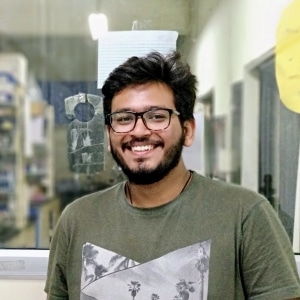
Jay is in the third year of his PhD at Savitribai Phule Pune University, researching the applications of mesenchymal stem cells and nanocarrier for bone tissue engineering.
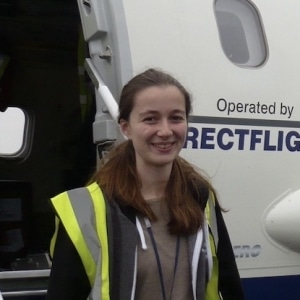
Freya’s in the final year of her PhD at the University of Leeds. Her project is about improving the precision of observations between collocated ground-based weather radar and airborne platforms.
Join Thousands of Students
- Roles and responsibilities of supervisors
Introduction
- Knowledge of regulations, policies and procedures
- Advice on program of study, research and professional development
- Meetings/consultation
- Financial assistance
- Intellectual property
- Publications
- Withdrawal of supervisory duties
- Accommodation
Introduction
Effective graduate student supervision requires complex interactions between graduate students and their supervisors. The role of a supervisor is threefold: to advise graduate students, monitor their academic progress, and act as a mentor. Supervisors not only provide guidance, instruction and encouragement in the research activities of their students, but also take part in the evaluation and examination of their students’ progress, performance and navigation through the requirements of their academic program with the goal to ensure that their students are successful.
Supervisors are responsible for fostering the intellectual and scholarly development of their students. They also play an important role in providing advice about professional development and both academic and non-academic career opportunities, as they are able, and based upon the student’s career interests.
While these expectations apply to all graduate students, supervising PhD students reflects a longer-term, more substantive commitment. The privilege to supervise PhD students requires that the supervisor hold Approved Doctoral Dissertation Supervisor (ADDS) status. The intent of ADDS policy is to ensure that faculty have the appropriate knowledge to facilitate excellence in PhD supervision.
return to top
Knowledge of regulations, policies and procedures
Effective graduate student supervision requires a knowledge and understanding of the University’s requirements and expectations. To this end, supervisors should:
2.1 Be knowledgeable and remain updated on department, Faculty and University regulations, policies and procedures, and have these protocols guide the supervisors’ decision-making and behaviour as they interact with graduate students. Supervisors are encouraged to take the necessary steps to be well-informed with those Policies identified in section 1.2 .
2.2 Be familiar with the support services available to students and faculty at the University including those articulated in section 1.2 . This information is normally available through department graduate co-ordinators, Faculty Graduate Studies Offices, Graduate Studies and Postdoctoral Affairs (GSPA), the Graduate Student Association (GSA) or the University Secretariat.
2.3 Be informed about University of Waterloo policies and procedures that inform academic integrity (Office of Research).
2.4 Be aware of the University of Waterloo and Tri-Agency policies and procedures associated with the conduct of research. Where appropriate, supervisors should be prepared to provide guidance to students on:
- The responsible conduct of research, with particular emphasis on the Tri-Agency Framework as defined in the Faculty Association of University of Waterloo (FAUW) /University of Waterloo memorandum of Agreement (Section 14).
- The ethical conduct of research (Office of Research) involving animals, animal or human tissues, and human participants
2.5 Have knowledge of the policies and procedures that govern international travel and security that can be found at Waterloo International.
return to top
Advice on program of study, research and professional development
As noted above, supervisors are expected to serve as mentors to their graduate students. To this end, supervisors should be prepared to provide well-informed advice on academics and professional development. More specifically, supervisors should be prepared to advise students on:
2.6 An academic program that is challenging, at the appropriate level for the degree being sought, and that can be accomplished within commonly understood and desirable time and resource expectations of the student and the supervisor.
2.7 The choice of courses and seminars needed to fulfil the degree requirements.
2.8 The development and construct of a research topic and proposal.
2.9 The development of a communication plan with the supervisory/advisory committee as to how the student’s progress will be assessed (including during thesis writing and completion), and the role of advisory committee members in the assessment.
2.10 The availability of internships, practica, co-op or other experiential learning opportunities as part of the program.
2.11 The availability of professional development resources for Waterloo graduate students to help advance the students’ career objectives.
Meetings/consultation
The establishment and communication of common expectations are critical elements to positive experiences for both graduate students and their supervisors. Achieving these outcomes can be facilitated by regular meetings and/or consultation between students, their supervisors, and where appropriate advisory committees. Especially important is timely feedback on students’ written submissions.
The University encourages supervisors to:
2.12 Ensure, especially important in the case of doctoral students, that the student has:
- An advisory committee as required.
- A program of study consistent with department and Faculty requirements that has been approved by the advisory committee as required.
- A research plan that is appropriate in breadth, depth and time to completion (see Milestones in master's and doctoral programs ).
2.13 Arrange for regular (as agreed by the student and supervisor) meetings (which may involve the advisory committee) with students for consultation to ensure steady progress. The frequency of such meetings will depend on the discipline/field of study, type of program, and the student’s progress. At least two, preferably more, meetings should be arranged in each academic term. Supervisors should also be reasonably accessible for meetings requested by their students. The approach to these student meetings should be individualized to reflect the needs of the student. For example, some students may need more support while other may need less.
2.14 Communicate their evaluation of student progress to the department once a year or more often if required. The report should clearly indicate the status of the student’s progress (i.e., satisfactory or unsatisfactory). In the latter case, the report must include a clearly articulated set of conditions that if satisfied will restore the student’s status to satisfactory. Where the supervisor feels that the student will have serious difficulties finishing the program, the supervisor, in consultation with the advisory committee as appropriate, will inform in writing, both the student and the graduate officer of the nature of the problem(s), suggested remedies and may recommend withdrawal from the program. More information on assessing students’ progress can be found in the Graduate Studies Academic Calendar.
2.15 Thoroughly review and provide constructive feedback on all written materials relevant to the thesis or research paper submitted by their students. The supervisor and the student are encouraged to establish in writing expectations on what constitutes timely feedback; a timeframe of two to three weeks depending on the complexity of the document is commonly applied. However, this can vary depending on various circumstances such as travel or vacation. These circumstances should be discussed between the supervisor and student.
2.16 Have knowledge of the guidelines for evaluating students’ progress in a research program (Graduate Studies Academic Calendar).
2.17 Inform students about the broad spectrum of resources available (Writing and Communication Centre) to facilitate development of oral communication and writing skills.
2.18 Be active and supportive in promoting students’ well-being. This may include:
- Inquiring about a student’s well-being, as appropriate.
- Directing students to appropriate support services , including Mental Health and Wellness resources (Campus Wellness).
- Displaying empathy towards the student.
2.19 Complete as appropriate the University requirements for Sexual violence awareness, referral and support training (Human Rights, Equity and Inclusion Office) to understand how to respond to disclosures of sexual violence and refer students to the appropriate supports.
The University recognizes that supervisors will be away from the University for extended periods of time (e.g., sabbatical, satellite campus, visiting professorship). Being physically away from the University does not preclude a supervisor from remaining engaged with their graduate students. In cases where the supervisor will not be available either in person or via electronic communications, the supervisor should:
2.20 Inform students, prospective students and the department of any anticipated extended period where communication will not be occurring. In cases when the absence is for a period of two months or more, supervisors should arrange for suitable communication methods. Interim supervision also must be arranged, for example, using members of advisory committees. Supervisors must inform the student’s department (chair/graduate officer) of the arrangements made for the period of absence, including supervision of laboratory or field work where graduate students continue to work during the absence.
2.21 Ensure students know that in situations where a supervisor works away from campus for two months or more and where their students can accompany the supervisor, the decision to remain on campus or to follow the supervisor rests entirely with the student. Students shall face no pressure (explicit or implicit) or consequences when making this choice and are not required to provide any reason.
As with the departmental representatives, supervisors have responsibility to advance safety. More specifically, supervisors should:
2.22 Ensure a safe working environment both on and off campus (working alone, field work) by assessing hazards and implementing appropriate controls. This must be in accordance with the Occupational Health and Safety Act, Policy 34 (Secretariat) and department and Faculty regulations. All supervisors must complete mandatory health and safety supervisor awareness training (Safety Office) and must ensure that graduate students complete both mandatory and work-specific safety training. More information can be found on the Safety Office website.
2.23 Ensure that students obtain additional training when new safety risks arise and ensure training is kept up to date.
Inherent to graduate education are the dissemination of knowledge and the participation in scholarly activities away from the University campus. Travel (domestic and international) can include fieldwork, conferences, course work and other work related to the thesis. Supervisors are encouraged to support students’ travel to accomplish these important objectives. Supervisors should:
2.24 Follow or encourage students to follow Policy 31 (Secretariat) that governs University-sanctioned travel.
2.25 Categorize and report risk associated with travel. Low risk (Safety Office) are activities for which it is expected that participants will encounter hazards that are no greater than what they encounter in their everyday lives. Examples of significant risk (e.g. industrial sites, remote regions etc.) are noted on the Safety Office website . Travel or field work that involves significant risk must be documented using the Fieldwork Risk Management Form from the Safety Office . For low risk activities off campus, supervisors should:
- Provide advice on preparation for pre-departure orientation and planning for any travel and including associated risk, as they are able;
2.26 Document the student(s) location and duration of travel, including personal and emergency contact information. Review the material provided by Waterloo International to understand how to best mitigate risk and ensure safety for international travel.
2.27 Encourage students to register using the Pre-departure Travel Form at Waterloo International .
2.28 Consult the Government of Canada Travel Advice and Advisories web page for the international destination and discuss the mitigation of risk with the students to the destination.
Financial assistance
Supervisors regularly provide financial support for their graduate students. Both the supervisor and the student benefit when a clear understanding exists of the value of funding, and the academic outcomes that should occur from the supported activities. Specifically, supervisors should:
2.29 Be informed about the spectrum of funding opportunities available through the department, Faculty and Graduate Studies and Postdoctoral Affairs (GSPA) for students in financial need and to communicate these sources to student.
2.30 Communicate clearly and in writing to their students the terms (e.g., amounts, length of time, conditions) of the financial commitment being made when financial assistance is to be provided from research grants or contracts under the supervisor’s direction.
2.31 Support students’ understanding of their funding, including a consideration of student expenses (primarily tuition and housing) and taxation, if appropriate.
Intellectual property
Increasingly, students and supervisors enter into their academic relationships with previously established intellectual property (IP). Moreover, students and supervisors may have an expectation that their collective work may produce new IP. Best practices include the articulation of students’ and supervisors’ understanding of IP relationships at regular intervals throughout the students’ academic program. More specifically, supervisors should:
2.32 Discuss issues related to intellectual property such as patents, software, copyright, and income from sales and royalties, and inform students of University policies about intellectual property and the conduct of research. It should be recognized that, in accordance with Policy 73 (Secretariat), intellectual property normally is owned by the creators. However, the University retains a royalty-free right to use, for educational and research purposes, any intellectual property created by faculty, staff and students. Ideally, supervisors and students should enter into a written agreement that expresses IP owned by either party prior to beginning the research relationship and the default way in which IP created by the researchers’ joint activities will be owned. A common example is an assumption in the absence of an explicit agreement of joint IP ownership, with each researcher owning an equal share.
2.33 Ensure that students are aware of implications and/or obligations regarding intellectual property of research conducted under contract. If appropriate, discuss with their students and any research partners the protection of intellectual property by patent or copyright. Any significant intellectual contribution by a student must be recognized in the form of co-authorship. Supervisors must convey to students, in advance of publication, whether they intend to recognize the student as co-author for work under contract.
Publications
Academic outputs – in various forms – document and demonstrate ownership of creative research and other scholarly activities. These outputs are important for advancing knowledge and catalyzing additional scholarly activity in these areas and should be encouraged. When supervisors and graduate students work collectively on these academic works, it is important for both that their relative contributions are represented appropriately. To achieve these goals, supervisors should:
2.34 Discuss with their students, at an early stage of their program, authorship practices within the discipline and University policies about publications ( Policy 73 on the Secretariat website).
2.35 Discuss and reach agreement with students, well in advance of publication and ideally at the outset of collaboration, the way in which authorship will be shared, if appropriate, between the supervisor, the student and other contributors for work conducted under contract.
2.36 Encourage the dissemination of students’ research results by publication in scholarly and research journals, presentation at conferences (domestic or international) and seminars;
2.37 Motivate the dissemination of research through non-traditional or non-academic avenues (e.g. Open Access resources, public presentations, and popular media).
Withdrawal of supervisory duties
In rare cases supervisors may determine that they are not prepared or able to continue in a supervisory capacity. When this occurs, the supervisor is required to:
2.38 Follow the guidelines in the Graduate Studies Academic Calendar regarding University Responsibilities Regarding Supervisory Relationships that outlines the steps for dissolution of the supervisory relationship.
back to top
Accommodation
The University is eager to establish conditions that maximize graduate students’ likelihood of success. To this end, supervisors:
2.39 Have a duty to engage in accommodations processes with AccessAbility Services , as requested, and to provide appropriate accommodation to the point of undue hardship.
2.40 Remain informed of their roles and responsibilities with respect to accommodations.
<< previous section : Roles and responsibilities of departments, graduate officers and graduate co-ordinators
>> next section : Roles and responsibilities of graduate students

Related links
- Home - Guide for Graduate Research and Supervision
- Introduction to the Guide for Graduate Research and Supervision
- Roles and responsibilities of departments, graduate officers and graduate co-ordinators
- Roles and responsibilities of graduate students
- Roles and responsibilities of advisory committees
- Key university policies and reference materials
Graduate Studies and Postdoctoral Affairs (GSPA)
Needles Hall, second floor, room 2201
Graduate Studies Academic Calendar
Website feedback
- Contact Waterloo
- Maps & Directions
- Accessibility
The University of Waterloo acknowledges that much of our work takes place on the traditional territory of the Neutral, Anishinaabeg and Haudenosaunee peoples. Our main campus is situated on the Haldimand Tract, the land granted to the Six Nations that includes six miles on each side of the Grand River. Our active work toward reconciliation takes place across our campuses through research, learning, teaching, and community building, and is co-ordinated within the Office of Indigenous Relations .
An official website of the United States government
The .gov means it’s official. Federal government websites often end in .gov or .mil. Before sharing sensitive information, make sure you’re on a federal government site.
The site is secure. The https:// ensures that you are connecting to the official website and that any information you provide is encrypted and transmitted securely.
- Publications
- Account settings
Preview improvements coming to the PMC website in October 2024. Learn More or Try it out now .
- Advanced Search
- Journal List
- PLoS Comput Biol
- v.17(9); 2021 Sep

Ten simple rules for choosing a PhD supervisor
Department of Biology, Dalhousie University, Halifax, Nova Scotia, Canada
Catherine Bannon
J. scott p. mccain, introduction.
The PhD beckons. You thought long and hard about why you want to do it, you understand the sacrifices and commitments it entails, and you have decided that it is the right thing for you. Congratulations! Undertaking a doctoral degree can be an extremely rewarding experience, greatly enhancing your personal, intellectual, and professional development. If you are still on the fence about whether or not you want to pursue a PhD, see [ 1 , 2 ] and others to help you decide.
As a PhD student in the making, you will have many important decisions to consider. Several of them will depend on your chosen discipline and research topic, the institution you want to attend, and even the country where you will undertake your degree. However, one of the earliest and most critical decisions you will need to make transcends most other decisions: choosing your PhD thesis supervisor. Your PhD supervisor will strongly influence the success and quality of your degree as well as your general well-being throughout the program. It is therefore vital to choose the right supervisor for you. A wrong choice or poor fit can be disastrous on both a personal and professional levels—something you obviously want to avoid. Unfortunately, however, most PhD students go through the process of choosing a supervisor only once and thus do not get the opportunity to learn from previous experiences. Additionally, many prospective PhD students do not have access to resources and proper guidance to rely on when making important academic decisions such as those involved in choosing a PhD supervisor.
In this short guide, we—a group of PhD students with varied backgrounds, research disciplines, and academic journeys—share our collective experiences with choosing our own PhD supervisors. We provide tips and advice to help prospective students in various disciplines, including computational biology, in their quest to find a suitable PhD supervisor. Despite procedural differences across countries, institutions, and programs, the following rules and discussions should remain helpful for guiding one’s approach to selecting their future PhD supervisor. These guidelines mostly address how to evaluate a potential PhD supervisor and do not include details on how you might find a supervisor. In brief, you can find a supervisor anywhere: seminars, a class you were taught, internet search of interesting research topics, departmental pages, etc. After reading about a group’s research and convincing yourself it seems interesting, get in touch! Make sure to craft an e-mail carefully, demonstrating you have thought about their research and what you might do in their group. After finding one or several supervisors of interest, we hope that the rules bellow will help you choose the right supervisor for you.
Rule 1: Align research interests
You need to make sure that a prospective supervisor studies, or at the very least, has an interest in what you want to study. A good starting point would be to browse their personal and research group websites (though those are often outdated), their publication profile, and their students’ theses, if possible. Keep in mind that the publication process can be slow, so recent publications may not necessarily reflect current research in that group. Pay special attention to publications where the supervisor is senior author—in life sciences, their name would typically be last. This would help you construct a mental map of where the group interests are going, in addition to where they have been.
Be proactive about pursuing your research interests, but also flexible: Your dream research topic might not currently be conducted in a particular group, but perhaps the supervisor is open to exploring new ideas and research avenues with you. Check that the group or institution of interest has the facilities and resources appropriate for your research, and/or be prepared to establish collaborations to access those resources elsewhere. Make sure you like not only the research topic, but also the “grunt work” it requires, as a topic you find interesting may not be suitable for you in terms of day-to-day work. You can look at the “Methods” sections of published papers to get a sense for what this is like—for example, if you do not like resolving cryptic error messages, programming is probably not for you, and you might want to consider a wet lab–based project. Lastly, any research can be made interesting, and interests change. Perhaps your favorite topic today is difficult to work with now, and you might cut your teeth on a different project.
Rule 2: Seek trusted sources
Discussing your plans with experienced and trustworthy people is a great way to learn more about the reputation of potential supervisors, their research group dynamics, and exciting projects in your field of interest. Your current supervisor, if you have one, could be aware of position openings that are compatible with your interests and time frame and is likely to know talented supervisors with good reputations in their fields. Professors you admire, reliable student advisors, and colleagues might also know your prospective supervisor on various professional or personal levels and could have additional insight about working with them. Listen carefully to what these trusted sources have to say, as they can provide a wealth of insider information (e.g., personality, reputation, interpersonal relationships, and supervisory styles) that might not be readily accessible to you.
Rule 3: Expectations, expectations, expectations
A considerable portion of PhD students feel that their program does not meet original expectations [ 3 ]. To avoid being part of this group, we stress the importance of aligning your expectations with the supervisor’s expectations before joining a research group or PhD program. Also, remember that one person’s dream supervisor can be another’s worst nightmare and vice versa—it is about a good fit for you. Identifying what a “good fit” looks like requires a serious self-appraisal of your goals (see Rule 1 ), working style (see Rule 5 ), and what you expect in a mentor (see Rule 4 ). One way to conduct this self-appraisal is to work in a research lab to get experiences similar to a PhD student (if this is possible).
Money!—Many people have been conditioned to avoid the subject of finances at all costs, but setting financial expectations early is crucial for maintaining your well-being inside and outside the lab. Inside the lab, funding will provide chemicals and equipment required for you to do cool research. It is also important to know if there will be sufficient funding for your potential projects to be completed. Outside the lab, you deserve to get paid a reasonable, livable stipend. What is the minimum required take-home stipend, or does that even exist at the institution you are interested in? Are there hard cutoffs for funding once your time runs out, or does the institution have support for students who take longer than anticipated? If the supervisor supplies the funding, do they end up cutting off students when funds run low, or do they have contingency plans? ( Fig 1 ).

Professional development opportunities—A key aspect of graduate school training is professional development. In some research groups, it is normal for PhD students to mentor undergraduate students or take a semester to work in industry to get more diverse experiences. Other research groups have clear links with government entities, which is helpful for going into policy or government-based research. These opportunities (and others) are critical for your career and next steps. What are the career development opportunities and expectations of a potential supervisor? Is a potential supervisor happy to send students to workshops to learn new skills? Are they supportive of public outreach activities? If you are looking at joining a newer group, these sorts of questions will have to be part of the larger set of conversations about expectations. Ask: “What sort of professional development opportunities are there at the institution?”
Publications—Some PhD programs have minimum requirements for finishing a thesis (i.e., you must publish a certain number of papers prior to defending), while other programs leave it up to the student and supervisor to decide on this. A simple and important topic to discuss is: How many publications are expected from your PhD and when will you publish them? If you are keen to publish in high-impact journals, does your prospective supervisor share that aim? (Although question why you are so keen to do so, see the San Francisco Declaration on Research Assessment ( www.sfdora.org ) to learn about the pitfalls of journal impact factor.)
Rule 4: It takes two to tango
Sooner or later, you will get to meet and interview with a prospective PhD supervisor. This should go both ways: Interview them just as much as they are interviewing you. Prepare questions and pay close attention to how they respond. For example, ask them about their “lab culture,” research interests (especially for the future/long term), and what they are looking for in a graduate student. Do you feel like you need to “put on an act” to go along with the supervisor (beyond just the standard interview mode)? Represent yourself, and not the person you think they are looking for. All of us will have some interviews go badly. Remember that discovering a poor fit during the interview has way fewer consequences than the incompatibility that could arise once you have committed to a position.
To come up with good questions for the prospective supervisor, first ask yourself questions. What are you looking for in a mentor? People differ in their optimal levels of supervision, and there is nothing wrong with wanting more or less than your peers. How much career guidance do you expect and does the potential supervisor respect your interests, particularly if your long-term goals do not include academia? What kind of student might not thrive in this research group?
Treat the PhD position like a partnership: What do you seek to get out of it? Keep in mind that a large portion of research is conducted by PhD students [ 4 ], so you are also an asset. Your supervisor will provide guidance, but the PhD is your work. Make sure you and your mentor are on the same page before committing to what is fundamentally a professional contract akin to an apprenticeship (see “ Rule 3 ”).
Rule 5: Workstyle compatibility
Sharing interests with a supervisor does not necessarily guarantee you would work well together, and just because you enjoyed a course by a certain professor does not mean they are the right PhD supervisor for you. Make sure your expectations for work and work–life approaches are compatible. Do you thrive on structure, or do you need freedom to proceed at your own pace? Do they expect you to be in the lab from 6:00 AM to midnight on a regular basis (red flag!)? Are they comfortable with you working from home when you can? Are they around the lab enough for it to work for you? Are they supportive of alternative work hours if you have other obligations (e.g., childcare, other employment, extracurriculars)? How is the group itself organized? Is there a lab manager or are the logistics shared (fairly?) between the group members? Discuss this before you commit!
Two key attributes of a research group are the supervisor’s career stage and number of people in the group. A supervisor in a later career stage may have more established research connections and protocols. An earlier career stage supervisor comes with more opportunities to shape the research direction of the lab, but less access to academic political power and less certainty in what their supervision style will be (even to themselves). Joining new research groups provides a great opportunity to learn how to build a lab if you are considering that career path but may take away time and energy from your thesis project. Similarly, be aware of pros and cons of different lab sizes. While big labs provide more opportunity for collaborations and learning from fellow lab members, their supervisors generally have less time available for each trainee. Smaller labs tend to have better access to the supervisor but may be more isolating [ 5 , 6 ]. Also note that large research groups tend to be better for developing extant research topics further, while small groups can conduct more disruptive research [ 7 ].
Rule 6: Be sure to meet current students
Meeting with current students is one of the most important steps prior to joining a lab. Current students will give you the most direct and complete sense of what working with a certain supervisor is actually like. They can also give you a valuable sense of departmental culture and nonacademic life. You could also ask to meet with other students in the department to get a broader sense of the latter. However, if current students are not happy with their current supervisor, they are unlikely to tell you directly. Try to ask specific questions: “How often do you meet with your supervisor?”, “What are the typical turnaround times for a paper draft?”, “How would you describe the lab culture?”, “How does your supervisor react to mistakes or unexpected results?”, “How does your supervisor react to interruptions to research from, e.g., personal life?”, and yes, even “What would you say is the biggest weakness of your supervisor?”
Rule 7: But also try to meet past students
While not always possible, meeting with past students can be very informative. Past students give you information on career outcomes (i.e., what are they doing now?) and can provide insight into what the lab was like when they were in it. Previous students will provide a unique perspective because they have gone through the entire process, from start to finish—and, in some cases, no longer feel obligated to speak well of their now former supervisor. It can also be helpful to look at previous students’ experiences by reading the acknowledgement section in their theses.
Rule 8: Consider the entire experience
Your PhD supervisor is only one—albeit large—piece of your PhD puzzle. It is therefore essential to consider your PhD experience as whole when deciding on a supervisor. One important aspect to contemplate is your mental health. Graduate students have disproportionately higher rates of depression and anxiety compared to the general population [ 8 ], so your mental health will be tested greatly throughout your PhD experience. We suggest taking the time to reflect on what factors would enable you to do your best work while maintaining a healthy work–life balance. Does your happiness depend on surfing regularly? Check out coastal areas. Do you despise being cold? Consider being closer to the equator. Do you have a deep-rooted phobia of koalas? Maybe avoid Australia. Consider these potentially even more important questions like: Do you want to be close to your friends and family? Will there be adequate childcare support? Are you comfortable with studying abroad? How does the potential university treat international or underrepresented students? When thinking about your next steps, keep in mind that although obtaining your PhD will come with many challenges, you will be at your most productive when you are well rested, financially stable, nourished, and enjoying your experience.
Rule 9: Trust your gut
You have made it to our most “hand-wavy” rule! As academics, we understand the desire for quantifiable data and some sort of statistic to make logical decisions. If this is more your style, consider every interaction with a prospective supervisor, from the first e-mail onwards, as a piece of data.
However, there is considerable value in trusting gut instincts. One way to trust your gut is to listen to your internal dialogue while making your decision on a PhD supervisor. For example, if your internal dialogue includes such phrases as “it will be different for me,” “I’ll just put my head down and work hard,” or “maybe their students were exaggerating,” you might want to proceed with caution. If you are saying “Wow! How are they so kind and intelligent?” or “I cannot wait to start!”, then you might have found a winner ( Fig 2 ).

Rule 10: Wash, rinse, repeat
The last piece of advice we give you is to do this lengthy process all over again. Comparing your options is a key step during the search for a PhD supervisor. By screening multiple different groups, you ultimately learn more about what red flags to look for, compatible work styles, your personal expectations, and group atmospheres. Repeat this entire process with another supervisor, another university, or even another country. We suggest you reject the notion that you would be “wasting someone’s time.” You deserve to take your time and inform yourself to choose a PhD supervisor wisely. The time and energy invested in a “failed” supervisor search would still be far less than what is consumed by a bad PhD experience ( Fig 3 ).

The more supervisors your interview and the more advice you get from peers, the more apparent these red flags will become.
Conclusions
Pursuing a PhD can be an extremely rewarding endeavor and a time of immense personal growth. The relationship you have with your PhD supervisor can make or break an entire experience, so make this choice carefully. Above, we have outlined some key points to think about while making this decision. Clarifying your own expectations is a particularly important step, as conflicts can arise when there are expectation mismatches. In outlining these topics, we hope to share pieces of advice that sometimes require “insider” knowledge and experience.
After thoroughly evaluating your options, go ahead and tackle the PhD! In our own experiences, carefully choosing a supervisor has led to relationships that morph from mentor to mentee into a collaborative partnership where we can pose new questions and construct novel approaches to answer them. Science is hard enough by itself. If you choose your supervisor well and end up developing a positive relationship with them and their group, you will be better suited for sound and enjoyable science.
Funding Statement
The authors received no specific funding for this work.

Ten types of PhD supervisor relationships – which is yours?
Lecturer, Griffith University
Disclosure statement
Susanna Chamberlain does not work for, consult, own shares in or receive funding from any company or organisation that would benefit from this article, and has disclosed no relevant affiliations beyond their academic appointment.
Griffith University provides funding as a member of The Conversation AU.
View all partners
It’s no secret that getting a PhD is a stressful process .
One of the factors that can help or hinder this period of study is the relationship between supervisor and student. Research shows that effective supervision can significantly influence the quality of the PhD and its success or failure.
PhD supervisors tend to fulfil several functions: the teacher; the mentor who can support and facilitate the emotional processes; and the patron who manages the springboard from which the student can leap into a career.
There are many styles of supervision that are adopted – and these can vary depending on the type of research being conducted and subject area.
Although research suggests that providing extra mentoring support and striking the right balance between affiliation and control can help improve PhD success and supervisor relationships, there is little research on the types of PhD-supervisor relationships that occur.
From decades of experience of conducting and observing PhD supervision, I’ve noticed ten types of common supervisor relationships that occur. These include:
The candidate is expected to replicate the field, approach and worldview of the supervisor, producing a sliver of research that supports the supervisor’s repute and prestige. Often this is accompanied by strictures about not attempting to be too “creative”.
Cheap labour
The student becomes research assistant to the supervisor’s projects and becomes caught forever in that power imbalance. The patron-client roles often continue long after graduation, with the student forever cast in the secondary role. Their own work is often disregarded as being unimportant.
The “ghost supervisor”
The supervisor is seen rarely, responds to emails only occasionally and has rarely any understanding of either the needs of the student or of their project. For determined students, who will work autonomously, the ghost supervisor is often acceptable until the crunch comes - usually towards the end of the writing process. For those who need some support and engagement, this is a nightmare.
The relationship is overly familiar, with the assurance that we are all good friends, and the student is drawn into family and friendship networks. Situations occur where the PhD students are engaged as babysitters or in other domestic roles (usually unpaid because they don’t want to upset the supervisor by asking for money). The chum, however, often does not support the student in professional networks.
Collateral damage
When the supervisor is a high-powered researcher, the relationship can be based on minimal contact, because of frequent significant appearances around the world. The student may find themselves taking on teaching, marking and administrative functions for the supervisor at the cost of their own learning and research.
The practice of supervision becomes a method of intellectual torment, denigrating everything presented by the student. Each piece of research is interrogated rigorously, every meeting is an inquisition and every piece of writing is edited into oblivion. The student is given to believe that they are worthless and stupid.
Creepy crawlers
Some supervisors prefer to stalk their students, sometimes students stalk their supervisors, each with an unhealthy and unrequited sexual obsession with the other. Most Australian universities have moved actively to address this relationship, making it less common than in previous decades.
Captivate and con
Occasionally, supervisor and student enter into a sexual relationship. This can be for a number of reasons, ranging from a desire to please to a need for power over youth. These affairs can sometimes lead to permanent relationships. However, what remains from the supervisor-student relationship is the asymmetric set of power balances.
Almost all supervision relationships contain some aspect of the counsellor or mentor, but there is often little training or desire to develop the role and it is often dismissed as pastoral care. Although the life experiences of students become obvious, few supervisors are skilled in dealing with the emotional or affective issues.
Colleague in training
When a PhD candidate is treated as a colleague in training, the relationship is always on a professional basis, where the individual and their work is held in respect. The supervisor recognises that their role is to guide through the morass of regulation and requirements, offer suggestions and do some teaching around issues such as methodology, research practice and process, and be sensitive to the life-cycle of the PhD process. The experience for both the supervisor and student should be one of acknowledgement of each other, recognising the power differential but emphasising the support at this time. This is the best of supervision.
There are many university policies that move to address a lot of the issues in supervisor relationships , such as supervisor panels, and dedicated training in supervising and mentoring practices. However, these policies need to be accommodated into already overloaded workloads and should include regular review of supervisors.
- professional mentoring
- PhD supervisors

Case Management Specialist

Lecturer / Senior Lecturer - Marketing

Assistant Editor - 1 year cadetship

Executive Dean, Faculty of Health

Lecturer/Senior Lecturer, Earth System Science (School of Science)
You're viewing this site as a domestic an international student
You're a domestic student if you are:
- a citizen of Australia or New Zealand,
- an Australian permanent resident, or
- a holder of an Australian permanent humanitarian visa.
You're an international student if you are:
- intending to study on a student visa,
- not a citizen of Australia or New Zealand,
- not an Australian permanent resident, or
- a temporary resident (visa status) of Australia.

What makes a good PhD supervisor?
UQ people Published 5 Jan, 2023 · 9-minute read
Your PhD advisor will play a key role in ensuring your Doctor of Philosophy is a rewarding and enjoyable experience.
Choosing a PhD supervisor can therefore be a daunting prospect. But we’ve enlisted the help of 2 UQ PhD advisors and researchers, Dr Loic Yengo and Professor Marina Reeves, to pinpoint exactly what you should be looking for. Better yet, they share their tips for maintaining a positive and fruitful working relationship with your PhD advisor throughout the typical 3-4 years of your candidature.
In this article, they'll cover:
- the role of a PhD supervisor
- how to choose a PhD supervisor
- the qualities of a good PhD supervisor
- tips for the first meeting with a PhD supervisor
- how to maintain a positive relationship with a PhD supervisor
- how to give and receive PhD supervisor feedback
- advice for ensuring a mutually beneficial relationship between candidate and advisor.
While the traditional and widely used term is ‘PhD supervisor’, here at UQ, we like to say ‘PhD advisor’ to emphasise the purpose of the role, which is to advise rather than manage. However, we use both titles interchangeably throughout this article.
Meet Professor Reeves: UQ PhD advisor and Deputy Associate Dean Research (Researcher Development), Faculty of Medicine
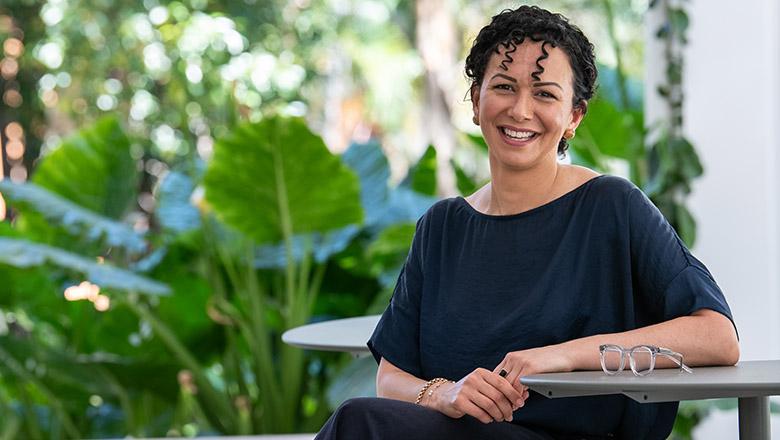
Professor Reeves’ research is focused on the role of diet, physical activity, and weight/body composition in improving outcomes and quality of life for women diagnosed with breast cancer. She is currently an advisor to 2 PhD candidates whose research concentrates on breast cancer survivorship.
“One of my candidate’s research is focused on understanding more about behaviours that disrupt circadian rhythm (our body clock), like when we sleep and eat, and the role these behaviours may play in improving the health and wellbeing of women after a breast cancer diagnosis,” says Professor Reeves.
"The other is focused on the subgroup of women with triple negative breast cancer, the most aggressive breast cancer subtype.”
This PhD project uses specific data to understand more about the incidence and survival of the different breast cancer subtypes.
“Her research is also exploring whether modifiable risk factors like body weight are associated with prognosis in women with triple negative breast cancer.”
Meet Dr Yengo: UQ PhD advisor and Group Leader of the Statistical Genomics Laboratory , Institute of Molecular Bioscience (IMB)
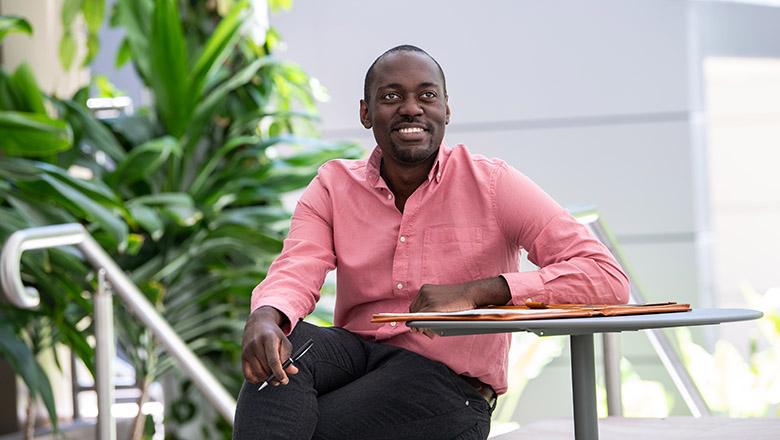
Doctor Yengo’s research involves matching genetic differences with particular character traits to help predict how societies will evolve. He is currently an advisor to 3 PhD candidates whose research topics are in a similar vein.
“PhD candidates in my lab work on a wide range of projects connected to the analysis of large-scale datasets containing DNA sequences of millions of individuals from across the world,” says Dr Yengo.
“One project is about using DNA patterns to understand how people choose their spouses; another one is about discovering genetic variations that cause disease in specific populations.”
The findings could help policymakers and health professionals better prepare for – and therefore reduce the burden of – genetic disorders and diseases. But how do Dr Yengo and his team draw meaning from such vast quantities of data?
“For each project, we often develop novel statistical techniques to analyse these large volumes of data to answer the fundamental questions that we are interested in,” he says.
“By ‘developing' novel statistical techniques, I mean deriving the maths underlying the algorithms, and also programming these algorithms into new software tools.”
“Our research is intrinsically multi-disciplinary but we do love maths and stats in the Lab!”
The role of a PhD supervisor
When it comes down to it, what exactly is the role of a PhD supervisor? And how will a good PhD advisor guide you with your research?
For Dr Yengo, it’s about achieving a balance between teaching practical skills and providing inspiration and support for the PhD candidate to pursue their passion.
“I believe that the role of a PhD supervisor is to help the candidate develop their own program of research, eventually,” he says.
“That includes teaching key skills such as reading a lot, asking the relevant questions, managing time and energy (this is a hard one) and not being afraid to dream big!”
Professor Reeves singles out 3 key roles:
- advising and guiding on the research process and research topic
- being an advocate for your PhD candidate – providing encouragement and opportunities, and helping them to open doors by introducing them to your networks
- being a role model – modelling integrity and championing others’ success.
Choosing a PhD supervisor
Choosing a PhD supervisor can be a tricky business. Undertaking your Doctor of Philosophy is a lengthy process , so you’re going to be in a professional relationship with your supervisor for a pretty long time. The pressure is on to find ‘the one’. But how do you know they’re going to be the right fit? Dr Yengo and Professor Reeves have a few tips to help you reach a conclusion.
The first step? Ironically, it’s doing your research on the researcher.
“I would suggest researching what the supervisor works on and what they have published before,” says Dr Yengo.
Professor Reeves acknowledges the importance of this step too.
“There needs to be a good alignment between their area of expertise and the PhD project so they can guide you appropriately.”
Step 2 is, according to both advisors, to not be afraid to shop around.
“Engage in informal chats with potential supervisors early in the process, especially when you are undecided,” says Dr Yengo.
“These discussions can help you form your own research questions and define a suitable direction for your research.”
Professor Reeves also encourages potential PhD candidates to seize opportunities to work with prospective advisors before locking them in.
“Whether that’s as an honours or other research coursework supervisor, summer research project, or research assistant work – it will allow you to see if their supervisory style and research is a good fit for you,” she says.
Read more tips on how to approach and choose a PhD supervisor , straight from UQ PhD candidates.
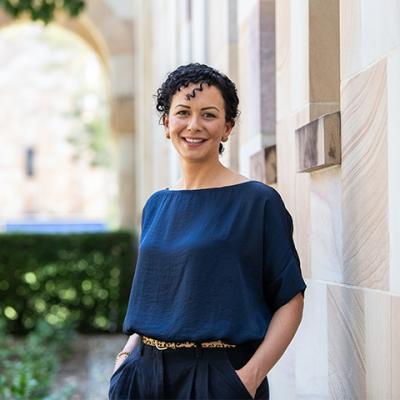
A clear discussion on expectations upfront is crucial - expectations around the working relationship and the project itself.
Qualities of a good PhD supervisor
A good PhD advisor requires a careful balance of traits and skills. You want them to provide guidance without being overbearing, and to offer advice while letting you figure things out yourself too. There's a lot to consider when choosing a PhD supervisor, so Dr Yengo and Professor Reeves have pinpointed a few of the most important qualities to look out for.
The first and arguably most critical is more of a requirement than a quality, and it’s that your potential PhD advisor is simply available . They need to have the time and energy to commit to you and your PhD.
A few other essential qualities of a good PhD supervisor are:
- clear communicator
- caring and approachable
- a leader in their field of research
- open to learning from others.
“By generous, I mean someone who is willing to share their wisdom and time to dedicate to your growth and development as a researcher,” says Professor Reeves.
She also advocates for finding an advisor who promotes a healthy work/life balance .
Dr Yengo explains that it’s important for a PhD advisor to be both a coach and a mentor , where as a coach they will help you find your own solution, and as a mentor they would share their experience and lead by example.
Tips for the first meeting with a PhD supervisor
Professor Reeves advises on using the first meeting with a PhD supervisor to outline expectations of both the advisor and candidate.
“A clear discussion on expectations up front is crucial – expectations around the working relationship and the project itself.”
“Find out how often they would meet with you, what resources and support would be available for you, what their research vision is or what they believe the impact of the PhD project will be.”
When Dr Yengo approaches the first meeting with his PhD candidates, he likes to find out:
- What is motivating the student to start a PhD?
- What are their technical skills and why are they interested in the topic?
- What are their career aspirations after completing their PhD? (Note that this can change in the process of doing a PhD.)
Heading into your first meeting prepared to outline your expectations and listen to theirs, and answer these questions, is a good way to create a solid foundation for the relationship between you and your PhD advisor.

Supervisors should create a culture that welcomes questions and mistakes, because that’s what it takes to learn.
The PhD supervisor relationship: keeping it positive
When it comes to maintaining a positive working relationship between PhD advisor and candidate, Dr Yengo and Professor Reeves both agree that the focus should be on the process, rather than the outcome.
“It’s important that the advisor takes an active interest in the candidate’s development as a researcher,” says Professor Reeves.
“A PhD is a research training process, so the focus shouldn’t just be on the outcome of the research project, but equally on the development of the candidate as a researcher.”
Dr Yengo says regular meetings are important for this reason. It encourages candidates to ask questions and share updates on their work.
“Candidates don’t have to wait until (they think) they have solved all the problems before discussing with their supervisor. This is often very counterproductive,” he says.
“Supervisors should create a culture that welcomes questions and mistakes, because that’s what it takes to learn.”
When considering the desired professional outcomes of a PhD, Professor Reeves encourages continued discussions around the candidate’s career plans, to ensure the research experience is always contributing to career goals.
“Regular conversations around the candidates’ career plans and development are important for maintaining a positive working relationship but also a successful outcome for the candidate post-PhD.”
Giving and receiving PhD supervisor feedback
A huge part of the PhD advisor and candidate relationship is giving and receiving feedback. And doing this effectively.
“The most important thing is to understand that feedback is part of the learning cycle,” says Dr Yengo.
“Feedback is never a definitive assessment or an exam; therefore, it should emphasise what can be improved in any given situation and towards a well-specified objective (e.g. a paper or a specific analysis).”
According to Professor Reeves, feedback should be:
- critically thought-out
- constructive, with clear guidance on what is needed to improve and what the next steps are
- positive – it should go beyond pinpointing constructive changes, to also identify what has been done well and what has improved from previous versions
- consistent – not changing from week to week
“If you aren’t getting this with your feedback, don’t be afraid to ask for more detail or guidance,” says Professor Reeves.
She also outlines the importance of acknowledging the receipt of feedback and voicing when you respectfully disagree with it.
“There will come a point in your candidature where you will be more of an expert on a topic than your advisor,” she says.
“So, if you disagree with feedback, instead of just disregarding it, explain why you disagree. That’s also helpful for your development in terms of being able to justify and defend your thesis.”
When it comes down to it, feedback isn’t only for the advisor to give.
“Both candidate and supervisor should be patient and willing to learn from each other,” says Dr Yengo.
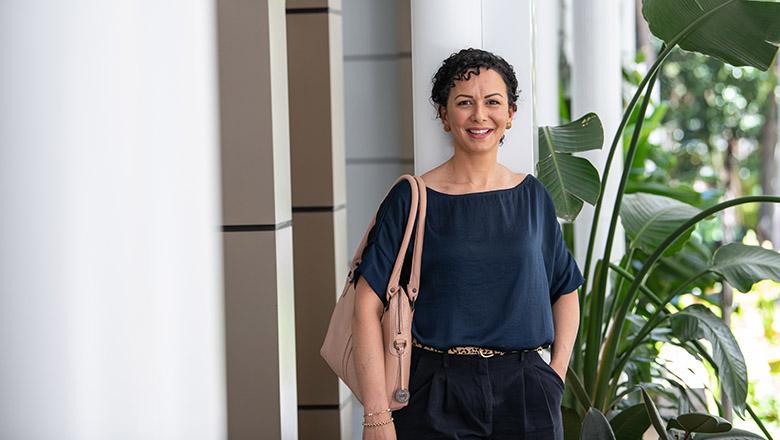
Making it mutually beneficial
Like all relationships, the one between a PhD advisor and candidate is a two-way street. Both must be invested in the working relationship for it to flourish. While the purpose of the process may be for the candidate to receive guidance and advice, you can also have a lot to offer your future advisor too.
“Interacting with PhD candidates can be extremely exciting as they often get a fresh perspective on problems,” says Dr Yengo.
“The professional relationship flourishes when we equally want to know the answer to the question. This can lead to fast and productive cycles of discussions, which often generate the most creative ideas.”
Professor Reeves believes mutual respect is key to a successful advisor/candidate relationship, as well as a shared vision.
Both advisors acknowledge the challenges of achieving a positive work/life balance while completing a PhD, and Professor Reeves points out how personal and professional respect can come into play here.
“I think it helps when they can see that you, as the advisor, care about the work and research, but also care about them as a person."
So, what makes a good PhD supervisor? Balance. Balance between professional and personal approaches to work and life, constructive and positive feedback, coaching and mentoring, leading and learning. Search for an advisor who can demonstrate balance in these areas, and you’re sure to have an enriching PhD experience.
Ready to pursue your passion for research with a Doctor of Philosophy?
Learn more about studying a PhD at UQ
Share this Facebook Twitter LinkedIn Email
Related stories

How to get a PhD
4-minute read
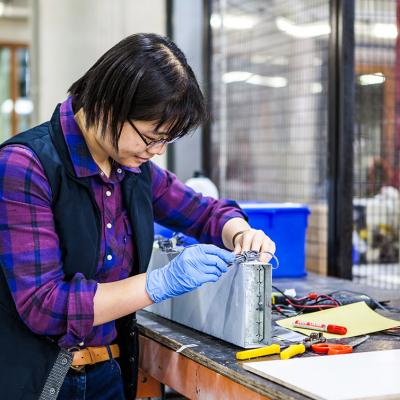
What makes a good PhD student?
3-minute read
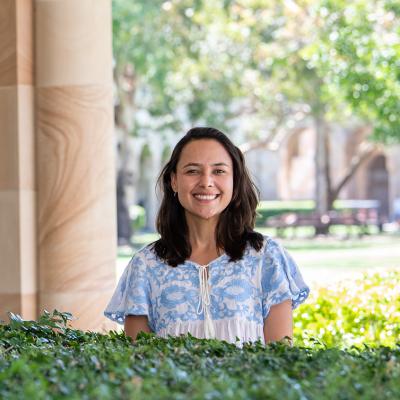
Why do a PhD at UQ?
7-minute read
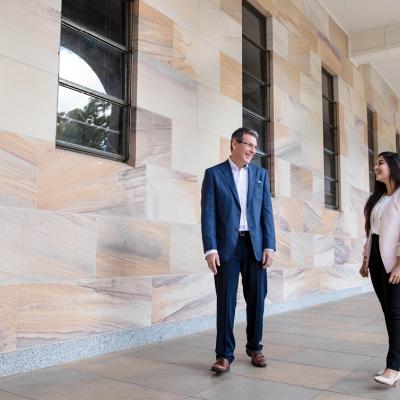
What's it like to do a PhD at UQ?
8-minute read

- Schools & departments

Fundamentals of PhD Supervision
Fundamentals of PhD Supervision is an online course that has been developed by the Institute for Academic Development in consultation with the Doctoral College and relevant staff in Colleges and Support Services.

This course aims to help new supervisors develop their understanding of the role and responsibilities of PhD supervisors at the University of Edinburgh, and to encourage experienced supervisors to reflect on and develop their practice with an increasingly diverse PhD student population.
Frequently Asked Questions
Who is this course for .
This course is for anyone who is currently supervising University of Edinburgh PhD students, or who will be supervising University of Edinburgh PhD students in the near future. This applies whether you are a Principal, Co- or Assistant Supervisor. It is suitable both for University of Edinburgh staff and supervisors who are external to the University.
When should I do this course?
It is a University expectation that all new PhD supervisors complete this course and that it is repeated every 5 years. If you are new to PhD supervision, or new to PhD supervision at the University of Edinburgh, you will ideally complete this course before you begin supervising a PhD student.
If you are an experienced supervisor you are required to complete the training every 5 years. The course is always available so you can dip back into it at any time to refresh your knowledge of specific areas.
How do I access the course?
University of Edinburgh staff should enrol on the course through People and Money Learning. Enrol here: Booking Link
External supervisors should contact [email protected] to gain access.
How long will it take to complete?
We estimate that it would take 3-4 hours to complete the course without watching the additional videos. The course is self-paced, you can leave and return to where you left off at any time.
To complete the course, and in order for your completion to be recorded, you must work through all modules and complete the required activities.
Does this course fulfil the compulsory training requirements for PhD Supervisors?
Yes, but your College or School may also run a supervisor briefing to complement this course.
What does the course cover?
Fundamentals of PhD Supervision is made up of 7 modules. These are aligned to the UK Council for Graduate Education (UKCGE) Good Supervisory Practice Framework.
Introduction to PhD supervision at Edinburgh
Recruitment and selection
Supervisory roles, responsibilities and approaches
Setting expectations and monitoring progress
Completion and final examination
Supporting wellbeing
Supporting professional and career development
Each of these modules summarises key information for supervisors. This includes signposting relevant policies, codes and regulations, and support and training available for you and your student. In each, there is a strong emphasis on encouraging self-reflection and further reading. The next steps section offers some pointers to further professional development.
The video content for each module is an additional part to the course. The videos are to provide further advice and information from the perspective of lived experience as a PhD supervisor.
Does doing this course cover compulsory training requirements set by other research student funders (e.g. Research Councils)?
This course may help supervisors to meet funder requirements as there is usually an expectation that you will meet your institutional training requirements for PhD supervisors.
However, your student's funder may require additional training beyond what is expected by the University of Edinburgh. You should check with the funder directly to ensure you are complying with any specific requirements for supervisors.
Will my attendance be recorded?
To complete the course successfully, and in order for your completion to be recorded, you must work through all sections. People and Money will automatically track completion of the training modules.
IAD will keep a record of attendance and completion of this course. Attendance updates will be provided to your school/deanery.
You will not be issued a certificate of attendance on completion but please email [email protected] if you require one.
Who do I contact if I have comments or problems accessing the course?
If you have problems accessing the course please email [email protected]
We welcome comments on the course so please contact us if you have any feedback. There is also a feedback form in the final module of the course.

Who do I contact if I have other questions about my role as a PhD supervisor?
Your first point of contact should be the relevant postgraduate staff in your School or Centre. This may be the PG administrative staff or the PG(R) Director or Head of the Graduate School. You can find contacts on the relevant School website:
https://www.ed.ac.uk/schools-departments/colleges-schools
If you have problems identifying the relevant contact please email us, letting us know which School or Centre your PhD student is part of, and we will put you in touch with the relevant staff. Please email [email protected]
This article was published on 2024-02-26
Research management
Sponsored by
Ten platinum rules for PhD supervisors
Is it time to add PhD supervision to your skill set? Tara Brabazon explains the pitfalls, challenges and rewards of this key academic role for the rookie mentor
Tara Brabazon
Additional links.
Elsevier helps researchers and healthcare professionals advance science and improve health outcomes for the benefit of society.
Discover elsevier.

You may also like

Popular resources
.css-1txxx8u{overflow:hidden;max-height:81px;text-indent:0px;} Rather than restrict the use of AI, embrace the challenge
Emotions and learning: what role do emotions play in how and why students learn, leveraging llms to assess soft skills in lifelong learning, how hard can it be testing ai detection tools, a diy guide to starting your own journal.
I receive strange emails. Some request money, sexual favours or a reference. Thousands, sent from students, have outlined the failures of PhD supervisors. From this dodgy digital pile, one message remains in my memory.
A young academic was outraged. He was so outraged that he used capital letters throughout the email. He was offended that I had written an article , aimed at prospective PhD students, that provided a guide to selecting a supervisor/adviser with care, ensuring that expectations, rights and responsibilities are assembled at the start of their enrolment. He was outraged – sorry, OUTRAGED – that I focused on students and their right to choose. I had supposedly displaced his capacity to supervise by suggesting that students check academic credentials and expertise.
- Want to get on in research? You need to manage people effectively
- Efficient communication that avoids overloading students or staff
- How to turn a PhD project into a commercial venture
This strange email captures the dense and difficult negotiations of power within PhD supervision. Students have choices. So do supervisors and advisers. The alignment of purpose and priorities is crucial. Too often, this relationship is toxic. Therefore, let’s park the outrage and provide 10 maxims to consider as we start – or continue – as a supervisor/adviser, so that we are authentic, credible and useful.
1. Just because you have completed a PhD does not mean you can supervise one
Very few academics hold teaching qualifications, particularly outside the education disciplines. Higher degree supervision – too often – is based on homology. We supervise as we were supervised. Or – more worryingly – we supervise how we think we were supervised. This strategy has never been effective – as confirmed by PhD attrition rates . As the PhD student cohort diversifies to include more women, Indigenous and First Nation students, rainbow students, scholars of colour, students with disabilities, and a wide span of ages, homology is not only inappropriate but destructive. My first 18 completions were all students under the age of 25. My next 30 were all over 40. Our students are changing . They will not put up with platitudes, excuses or comments about the good old days.
Experience is not enough. Expertise is required. Enrol in professional development courses. Learn how to supervise. Learn about doctoral studies. It is a burgeoning field of research. Do not assume that we know what we are doing because we graduated with a PhD. Simply because we drink milk does not mean we can run a dairy farm. In no other area of our scholarly lives would we generalise from a data set of one.
2. Any academic can meet a PhD student – the skill is enabling the completion and submission of a quality thesis
It is very pleasant to supervise PhD students. They are bright people who work hard and think deeply. Yet these meetings in and of themselves do not ensure completion or that the research will reach the intellectual level required of a PhD examination.
Do you know the intellectual standard required to pass a PhD in your discipline? In other words, can you read a student’s close-to-completed thesis and know that it will pass? Can you locate the line between major and minor corrections; major corrections and a revise and resubmit; and revise and resubmit and failure? Which disciplines encourage split decisions when examiners disagree? Do you know how the policies, procedures and regulations of your institution shape and frame the PhD thesis that is sent to examiners? How does the digital submission of the thesis transform its preparation and examination?
This knowledge is derived from learning about the doctoral policies and procedures in your institution, reading a large number of doctoral theses and examination reports, and volunteering to be a viva chair or milestone assessor as often as possible.
Talking to students over coffee or in a lab is important. Understanding the standard required for a doctoral thesis to pass with minor corrections is crucial.
3. Beginnings matter, so work hard in the first year
While the focus of the candidature – from the first day – must be on the examination, a short and successful enrolment is based on a powerhouse first year. Some of the most dreadful – and longest – candidatures I have seen have emerged from supervisors allowing students to wander about, thinking about their honours, master’s or capstone projects, drinking coffee and ambling through conferences, while complaining about their lack of progress.
The best candidatures begin as if the student is driving in a Grand Prix. Start your engines. Hammer to the first corner. It is important that students do not simply redo earlier projects. Find a subject area quickly, and then render it discrete, manageable and viable. If students can rapidly determine research questions, even if they are clumsy, then they have a focus. A strong first year of enrolment gives students confidence; they can publish early in the project and start to gain meaningful feedback.
4. Assess the student’s information literacy in the first month of their enrolment
Two pathways connect a student and a supervisor. The first involves teaching a student through their undergraduate years, and they continue through to a PhD with you as their supervisor. The second pathway involves students selecting you to supervise their project from outside your courses, university or country. Both modes of admission hold dangers, mainly involving assumptions about information literacy, academic literacy and disciplinary literacy.
Before my students start their supervision – whether I have known them for years or just begun a teaching and learning relationship – I ensure that they complete a PhD set-up document . This pamphlet, which I have used for every student I have supervised over 24 years, incorporates all modes of the doctorate – including the PhD by prior publication and the artefact-and-exegesis thesis – and fulfils a diagnostic role. It ensures that the student is thinking about a topic, they verify methodological, epistemological and ontological considerations, and also log their information literacy. For the supervisor, the completed set-up document and the subsequent meeting – which I usually schedule for two hours – provides the initiation into the doctoral programme.
From this diagnostic tool, a suite of professional development programmes can be inserted into the candidature, particularly involving the library, librarians and information literacy. From this foundation, literature reviews, systematic reviews and scoping reviews can emerge, which enable a rapid narrowing of the project and the development of research questions.
5. Assumptions kill doctorates
Students maintain assumptions about a PhD. So do supervisors. If these assumptions are not communicated and managed, students and supervisors move through the candidature misunderstanding each other. The resultant “conversations” are hooked into confusion, resentment, bitterness and anger. Statements such as: “It’s your PhD” and “Tell me what you want me to do next” pepper the enrolment. The set up document and initial meeting replace assumptions with talking points about the rights, responsibilities and roles of supervisors and students. A clear, honest discussion about meeting frequency, feedback, modes of communication and the management of challenges at the start of a candidature not only saves time but reduces the likelihood of changing supervisors through the programme and cuts student attrition.
6. The selection of examiners is the single most important moment in a doctoral programme
Examination matters to a PhD. Our last stand for quality assurance and excellence in our universities resides in doctoral programmes. If we “dial a mate” and bring in friends to examine, it is time to close our universities. Standards matter. When I was dean of graduate research, it was amazing how often I had very senior colleagues attacking me with aggression only seen in extreme cage fighting about the importance of their research partner, grant collaborator, co-author or former student acting as an examiner. The mantra would progress as follows (yes, this is a direct quotation): “There are only three experts in this field in the world. I am one of them and I am friends with the other two.” In this case, the area with only three international experts was – wait for it – body image.
Select an examiner who is intensely research-active, aligned to the field of the thesis without being so close that the student would be viewed as a threat, and resolutely independent of the supervisor.
To ensure a strong selection of external examiners, enact a full digital evaluation to ensure that they are research-active and a decent person, rather than in need of a Snickers at the first critique or differing view. Finally – and this is sad to write – select experienced researchers, supervisors and examiners. The toughest examiners are – obviously – the most inexperienced. They have a data set of one: their own thesis. They are a genius (obviously). Any thesis they read in the early years after their own submission and examination must be substandard (to their own).
To shift to the Star Wars universe, find a Yoda examiner rather than one with the impetuous confidence of a young Obi Wan or Luke Skywalker.
7. Make sure the SOCK is obvious, clear and present in the abstract (and the introduction and conclusion)
The PhD has one characteristic: a significant, original contribution to knowledge (SOCK) . Without a SOCK, a PhD will not pass. Each word is important. Research can be a contribution but not original. It can be original but not significant. Supervisor and student must work together to ensure that the SOCK is the strong frame for the candidature and thesis. The earlier a student can ascertain their SOCK, the smoother the progression to completion.
The SOCK is presented in the second sentence of the abstract: “My significant, original contribution to knowledge is…” As supervisors, we need to move the student into the space where they can complete this sentence as early as possible in their enrolment.
Examiners are paid very little to assess a thesis. It is hard work. Think about an examiner reading a thesis while drinking a glass of chianti. Therefore, in every chapter, a student must remind the chianti-fuelled examiner about the purpose of this chapter and how it aligns with the SOCK of the thesis. Ensure that the abstract, introduction, conclusion and every single chapter hook into the SOCK.
8. PhD students are not your slaves, sexual partners, un(der)paid research assistants or writers of your articles
One of the saddest memories of my academic career emerged in a meeting (obviously) when I had started as a dean of graduate research. Senior scholars – research heavyweights – were assembled in the room. Very early in the meeting one of these Mike Tysons described their PhD students as “slaves.” That was appalling. What was chilling was the laughter that erupted in response to this nasty noun.
PhD students do not exist to serve or service the supervisor. They are not drawing breath so that they can complete a supervisor’s research project or write a supervisor’s articles. We all know – personally and professionally – shocking stories about supervisors “appropriating” the work of their students or adding their name to papers in which they had minimal intellectual input. Research codes of conduct around the world – most stemming from the Vancouver protocol – are creating changes, with institutions and journals demanding transparency and integrity from all authors through the submission process.
PhD students need a supervisor to protect, guide, mentor and enable. It is an unequal relationship. Shocking cases have been revealed around the world of the sexual exploitation of students, from sexual harassment through to sexual assault. These cases demean all scholars. The standards we walk past are the standards we accept. A PhD candidate is a student, and therefore worthy of respect, care, guidance and clarity in the standards of a professional relationship.
9. Create a strong supervisory team
Most university systems around the world insist on a supervisory team. That change is welcome; we cannot guarantee that the scholars who start the supervision will remain in place until the examination. A team adds safety, and a safety net for the student.
Supervisory teams, composed of two or more colleagues, are important. Sometimes, the relationships are fraught or non-existent. Many co-supervisors are simply on paper for administrative purposes and not involved in the project. The best relationships involve one of the supervisors using their specific expertise – often in methodology – to enable the creation of a chapter. When that part of the project is completed, they step back from the supervision.
Supervisors should meet before any student is involved in the process to discuss their expectations, hopes and concerns about the project and the student. How often are meetings held? Who is involved in those meetings? How is feedback to be organised? How are disagreements – scholarly or otherwise – to be resolved? These questions must be answered and agreed on before the student is involved in the process.
10. Do not confuse the production of refereed articles with the construction of a thesis
Every PhD should have a dissemination strategy. Research must be available to ensure citizens and fellow scholars can use it – and transform it. Examiners also recognise the value of peer-reviewed publications as part of the PhD. Experienced supervisors remember that the best examiners differentiate between the processes of peer reviewing and examination.
I have published more than 250 refereed articles. I have graduated from only one PhD. The confusion between publishing articles and examination dumbs down our doctorates. Indeed, it is becoming customary to assume that three refereed articles are sufficient in scope, scale and quality to create a successful PhD examination.
Three articles in three years would not reach the level required to be “research-active” as a scholar. Many of us produce between five and 10 articles every year. Indeed, the PhD by prior publication , an unusual but burgeoning mode of doctorate, submits a long (20,000-40,000 words) contextual statement confirming the significant, original contribution to knowledge, followed by a large number of publications, often spanning from 12 to 25 articles.
In terms of quality assurance, how could three articles be equivalent to an integrated research project of 100,000 words? Indeed, how could three articles be equivalent to the 12 or more publications submitted through a PhD by prior publication?
Fine PhDs have been passed without any publications emerging from them. Theses with refereed articles have been subjected to revision and re-examination. Publishing research during a PhD is valuable. It must not be assumed that peer review and examination are equivalent or converge.
A final note: supervising PhD students is a privilege. It is not a right. Doctoral studies and the scholarship of supervision (SoS) literature are revealing how supervisory quality is built through experience, expertise, professional development and research-led andragogy. Our responsibilities as supervisors are not only to our students but also to our disciplines, to research ethics and the maintenance of standards. Great PhD students are our future. Great PhD supervisors remain at their service.
Tara Brabazon is professor of cultural studies at Flinders University. Her most recent books are 12 rules for (Academic) Life: A Stroppy Feminist Guide to Teaching, Learning, Politics and Jordan Peterson (Springer, 2022) and Comma: How to Restart, Reclaim and Reboot your PhD (Author’s Republic, 2022).
If you found this interesting and want advice and insight from academics and university staff delivered direct to your inbox each week, sign up for the THE Campus newsletter .
For more insights from Tara Brabazon:
How to get students through their PhD thesis
10 truths a PhD supervisor will never tell you
How not to write a PhD thesis
14 essential PhD questions answered
Rather than restrict the use of AI, embrace the challenge
Let’s think about assessments and ai in a different way, how students’ genai skills affect assignment instructions, how not to land a job in academia, contextual learning: linking learning to the real world, three steps to unearth the hidden curriculum of networking.
Register for free
and unlock a host of features on the THE site

Teaching & Learning
- Education Excellence
- Professional development
- Case studies
- Teaching toolkits
- MicroCPD-UCL
- Assessment resources
- Student partnership
- Generative AI Hub
- Community Engaged Learning
- UCL Student Success

Research and project supervision (all levels): an introduction
Supervising projects, dissertations and research at UCL from undergraduate to PhD.

1 August 2019
Many academics say supervision is one of their favourite, most challenging and most fulfilling parts of their job.
Supervision can play a vital role in enabling students to fulfil their potential. Helping a student to become an independent researcher is a significant achievement – and can enhance your own teaching and research.
Supervision is also a critical element in achieving UCL’s strategic aim of integrating research and education. As a research-intensive university, we want all students, not just those working towards a PhD, to engage in research.
Successful research needs good supervision.
This guide provides guidance and recommendations on supervising students in their research. It offers general principles and tips for those new to supervision, at PhD, Master’s or undergraduate level and directs you to further support available at UCL.
What supervision means
Typically, a supervisor acts as a guide, mentor, source of information and facilitator to the student as they progress through a research project.
Every supervision will be unique. It will vary depending on the circumstances of the student, the research they plan to do, and the relationship between you and the student. You will have to deal with a range of situations using a sensitive and informed approach.
As a supervisor at UCL, you’ll help create an intellectually challenging and fulfilling learning experience for your students.
This could include helping students to:
- formulate their research project and question
- decide what methods of research to use
- become familiar with the wider research community in their chosen field
- evaluate the results of their research
- ensure their work meets the necessary standards expected by UCL
- keep to deadlines
- use feedback to enhance their work
- overcome any problems they might have
- present their work to other students, academics or interested parties
- prepare for the next steps in their career or further study.
At UCL, doctoral students always have at least two supervisors. Some faculties and departments operate a model of thesis committees, which can include people from industry, as well as UCL staff.
Rules and regulations
Phd supervision.
The supervision of doctoral students’ research is governed by regulation. This means that there are some things you must – and must not – do when supervising a PhD.
- All the essential information is found in the UCL Code of Practice for Research Degrees .
- Full regulations in the UCL Academic Manual .
All staff must complete the online course Introduction to Research Supervision at UCL before beginning doctoral supervision.
Undergraduate and Masters supervision
There are also regulations around Master’s and undergraduate dissertations and projects. Check with the Programme Lead, your Department Graduate Tutor or Departmental Administrator for the latest regulations related to student supervision.
You should attend other training around research supervision.
- Supervision training available through UCL Arena .
Doctoral (PhD) supervision: introducing your student to the university
For most doctoral students, you will often be their main point of contact at UCL and as such you are responsible for inducting them into the department and wider community.
Check that your student:
- knows their way around the department and about the facilities available to them locally (desk space, common room, support staff)
- has attended the Doctoral School induction and has received all relevant documents (including the Handbook and code of practice for graduate research degrees )
- has attended any departmental or faculty inductions and has a copy of the departmental handbook.
Make sure your student is aware of:
- key central services such as: Student Support and Wellbeing , UCL Students' Union (UCLU) and Careers
- opportunities to broaden their skills through UCL’s Doctoral Skills Development Programme
- the wider disciplinary culture, including relevant networks, websites and mailing lists.
The UCL Good Supervision Guide (for PhD supervisors)
Establishing an effective relationship
The first few meetings you have with your student are critical and can help to set the tone for the whole supervisory experience for you and your student.
An early discussion about both of your expectations is essential:
- Find out your student’s motivations for undertaking the project, their aspirations, academic background and any personal matters they feel might be relevant.
- Discuss any gaps in their preparation and consider their individual training needs.
- Be clear about who will arrange meetings, how often you’ll meet, how quickly you’ll respond when the student contacts you, what kind of feedback they’ll get, and the norms and standards expected for academic writing.
- Set agendas and coordinate any follow-up actions. Minute meetings, perhaps taking it in turns with your student.
- For PhD students, hold a meeting with your student’s other supervisor(s) to clarify your expectations, roles, frequency of meetings and approaches.
Styles of supervision
Supervisory styles are often conceptualized on a spectrum from laissez-faire to more contractual or from managerial to supportive. Every supervisor will adopt different approaches to supervision depending on their own preferences, the individual relationship and the stage the student is at in the project.
Be aware of the positive and negative aspects of different approaches and styles.
Reflect on your personal style and what has prompted this – it may be that you are adopting the style of your own supervisor, or wanting to take a certain approach because it is the way that it would work for you.
No one style fits every situation: approaches change and adapt to accommodate the student and the stage of the project.
However, to ensure a smooth and effective supervision process, it is important to align your expectations from the very beginning. Discuss expectations in an early meeting and re-visit them periodically.
Checking the student’s progress
Make sure you help your student break down the work into manageable chunks, agreeing deadlines and asking them to show you work regularly.
Give your student helpful and constructive feedback on the work they submit (see the various assessment and feedback toolkits on the Teaching & Learning Portal ).
Check they are getting the relevant ethical clearance for research and/or risk assessments.
Ask your student for evidence that they are building a wider awareness of the research field.
Encourage your student to meet other research students and read each other’s work or present to each other.
Encourage your student to write early and often.
Checking your own performance
Regularly review progress with your student and any co-supervisors. Discuss any problems you might be having, and whether you need to revise the roles and expectations you agreed at the start.
Make sure you know what students in your department are feeding back to the Student Consultative Committee or in surveys, such as the Postgraduate Research Experience Survey (PRES) .
Responsibility for the student’s research project does not rest solely on you. If you need help, talk to someone more experienced in your department. Whatever the problem is you’re having, the chances are that someone will have experienced it before and will be able to advise you.
Continuing students can often provide the most effective form of support to new students. Supervisors and departments can foster this, for example through organising mentoring, coffee mornings or writing groups.
Be aware that supervision is about helping students carry out independent research – not necessarily about preparing them for a career in academia. In fact, very few PhD students go on to be academics.
Make sure you support your student’s personal and professional development, whatever direction this might take.
Every research supervision can be different – and equally rewarding.
Where to find help and support
Research supervision web pages from the UCL Arena Centre, including details of the compulsory Research Supervision online course.
Appropriate Forms of Supervision Guide from the UCL Academic Manual
the PhD diaries
Good Supervision videos (Requires UCL login)
The UCL Doctoral School
Handbook and code of practice for graduate research degrees
Doctoral Skills Development programme
Student skills support (including academic writing)
Student Support and Wellbeing
UCL Students' Union (UCLU)
UCL Careers
External resources
Vitae: supervising a docorate
UK Council for Graduate Education
Higher Education Academy – supervising international students (pdf)
Becoming a Successful Early Career Researcher , Adrian Eley, Jerry Wellington, Stephanie Pitts and Catherine Biggs (Routledge, 2012) - book available on Amazon
This guide has been produced by the UCL Arena Centre for Research-based Education . You are welcome to use this guide if you are from another educational facility, but you must credit the UCL Arena Centre.
Further information
More teaching toolkits - back to the toolkits menu
Research supervision at UCL
UCL Education Strategy 2016–21
Connected Curriculum: a framework for research-based education
The Laidlaw research and leadership programme (for undergraduates)
[email protected] : contact the UCL Arena Centre
Download a printable copy of this guide
Case studies : browse related stories from UCL staff and students.
Sign up to the monthly UCL education e-newsletter to get the latest teaching news, events & resources.
Education events
Funnelback feed: https://search2.ucl.ac.uk/s/search.json?collection=drupal-teaching-learn... Double click the feed URL above to edit
- Interesting
- Scholarships
- UGC-CARE Journals
PhD Supervisors – Unsung Heroes of Doctoral Students
How Supervisors Can Support Doctoral Students to Publish and Not Perish in Academia
Think a PhD student’s job is just research? Nope! They also need to explain their awesome findings to the world. But how? That’s where PhD supervisors come in – like secret weapons helping students share their research in the best way possible. In this article, iLovePhD explores how supervisors can turn students into research rockstars! It breaks down the key strategies PhD supervisors can use to empower their students to become successful research communicators.
PhD Supervisor’s Role in Doctoral Student Research Dissemination
1. understanding the needs of the student.
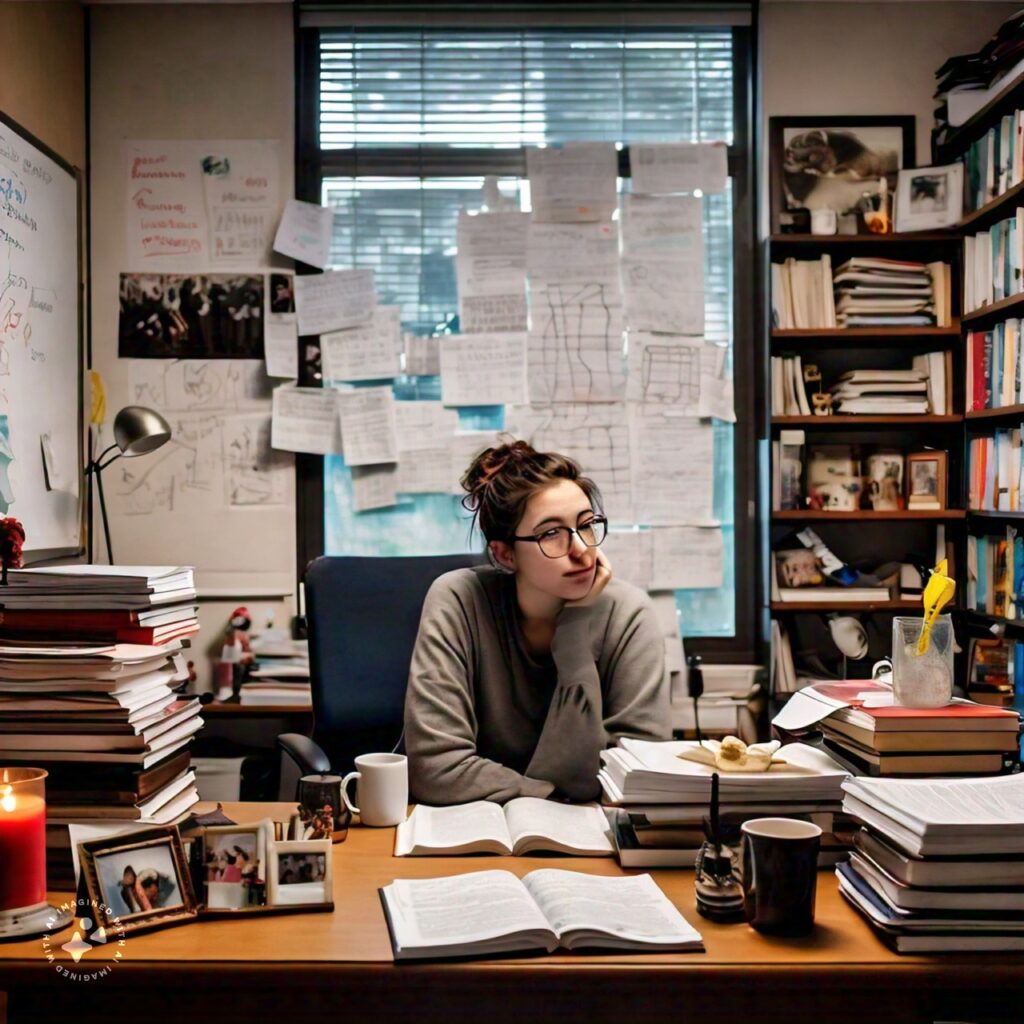
- Tailored Guidance: Supervisors who understand if a student aspires to academia or a different career path can tailor their advice. For example , a student aiming for a research position might need more emphasis on publishing in top academic journals , while someone targeting a policy role might benefit from learning how to write policy briefs.
- Transferable Skills: Regardless of career path, strong research, writing, and communication skills are valuable assets. Supervisors can highlight how these skills can be applied in various fields.
2. Demystifying Academic Publishing (For the Academically Inclined)

- Journal Selection: Help students choose journals relevant to their research topic and target audience. Imagine journals as specialized magazines for different research areas.
- Peer-Review Process : Explain how other experts anonymously review a student’s work and provide feedback. Workshops and online resources can equip students with knowledge to navigate this system.
3. Collaboration: A Launchpad for Success with PhD Supervisors and Scholars

- Co-Authorship: Encourage co-authoring research papers with PhD supervisors or established researchers. This allows students to learn the ropes of academic writing and publishing while building their reputation.
4. Sharpening the Writing Sword:

- Early & Frequent Writing: Encourage students to start writing early and practice explaining their research clearly and concisely. The more they practice, the better equipped they’ll be to write publishable articles.
Effective communication is key to successful research dissemination. Supervisors can encourage students to start writing early and often. The more they practice explaining their research clearly and concisely, the better equipped they’ll be to write publishable articles .
5. Expanding the Dissemination Toolbox (Beyond Journals)
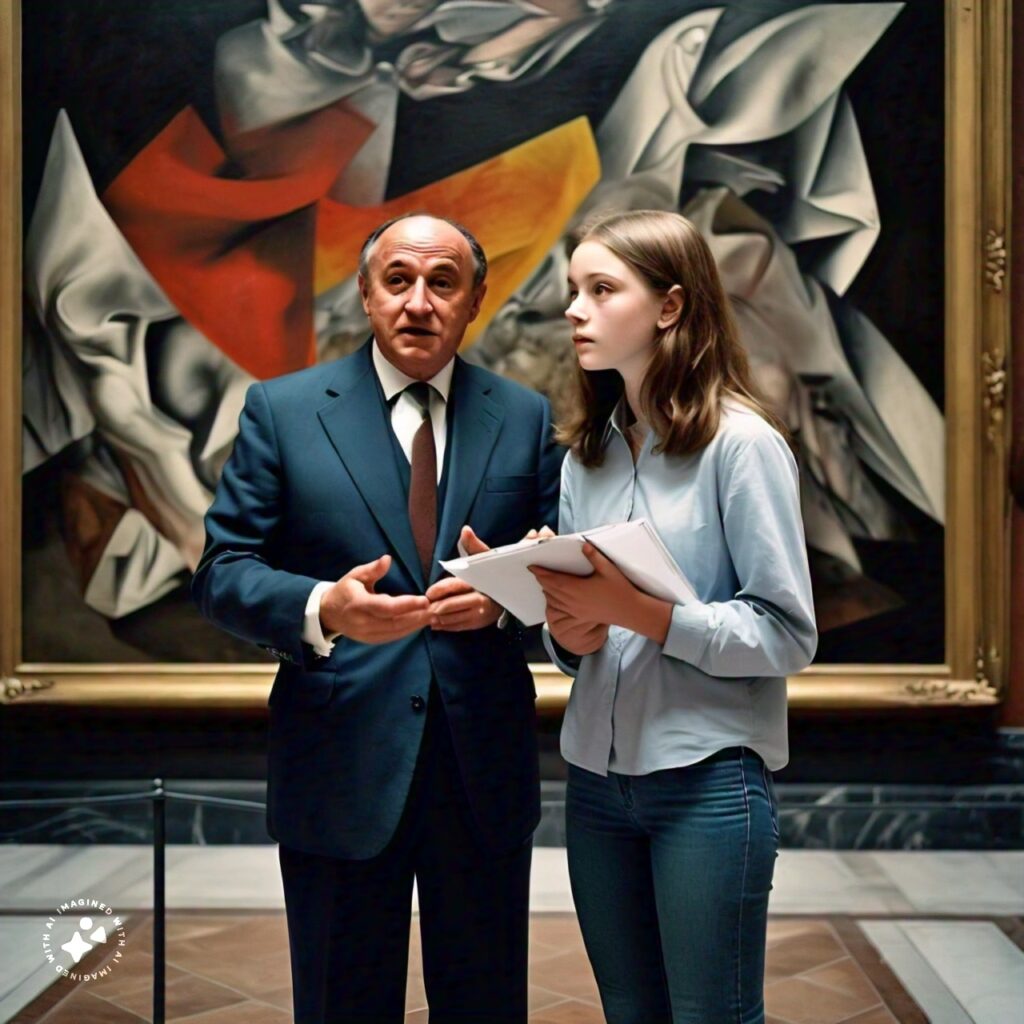
Research findings shouldn’t be confined to dusty academic journals! Supervisors can encourage students to explore alternative ways to share their knowledge. This could involve creating infographics, podcasts, policy briefs, or even writing op-ed pieces for the general public.
- Infographics : Visually represent complex data.
- Podcasts: Discuss research in a conversational format.
- Policy Briefs: Translate research into policy recommendations.
- Op-Eds: Share research insights with a broader audience in newspapers or online platforms.
Also Read: 7 Tips to Increase Your Citation Score
6. Building Resilience Through Feedback

- Handling Criticism: Help students view feedback from reviewers as a chance to improve, not a personal attack. Developing a “thick skin” is crucial for navigating the research world.
Publishing often involves receiving feedback from reviewers. Supervisors can help students develop a “thick skin” and view this feedback as a valuable opportunity to improve their work, not a personal attack. Learning to handle criticism constructively is an essential skill for any researcher.
7. The Feedback Loop: Continuous Improvement:

- Learning from Feedback: Encourage students to use feedback to strengthen their published work and future research communication efforts, both within academia and beyond.
Engaging with feedback not only strengthens a student’s published work but also benefits their future endeavors. By learning from reviewers’ comments, students can consistently improve the quality of their research communication, both within and outside academia.
Supervisors play a vital role in shaping doctoral students into successful research communicators. By understanding their students’ goals, providing tailored guidance, and fostering essential skills, supervisors can empower them to confidently share their research and make a significant impact on their chosen fields.
- 100 Top Journals
- peer review process
- PhD scholar
- supervisor guidance
PhD in India 2024 – Cost, Duration, and Eligibility for Admission
100 connective words for research paper writing, fulbright-kalam climate fellowship: fostering us-india collaboration, most popular, google ai for phd research – tools and techniques, india-canada collaborative industrial r&d grant, call for mobility plus project proposal – india and the czech republic, effective tips on how to read research paper, iitm & birmingham – joint master program, anna’s archive – download research papers for free, fulbright specialist program 2024-25, best for you, 24 best free plagiarism checkers in 2024, what is phd, popular posts, how to check scopus indexed journals 2024, how to write a research paper a complete guide, 480 ugc-care list of journals – science – 2024, popular category.
- POSTDOC 317
- Interesting 258
- Journals 234
- Fellowship 128
- Research Methodology 102
- All Scopus Indexed Journals 92

iLovePhD is a research education website to know updated research-related information. It helps researchers to find top journals for publishing research articles and get an easy manual for research tools. The main aim of this website is to help Ph.D. scholars who are working in various domains to get more valuable ideas to carry out their research. Learn the current groundbreaking research activities around the world, love the process of getting a Ph.D.
Contact us: [email protected]
Google News
Copyright © 2024 iLovePhD. All rights reserved
- Artificial intelligence

Thank you for visiting nature.com. You are using a browser version with limited support for CSS. To obtain the best experience, we recommend you use a more up to date browser (or turn off compatibility mode in Internet Explorer). In the meantime, to ensure continued support, we are displaying the site without styles and JavaScript.
- View all journals
- Explore content
- About the journal
- Publish with us
- Sign up for alerts
- Correspondence
- Published: 11 May 2017
PhD supervisors: be better mentors
- Devang Mehta 1 &
- Konstantinos Vavitsas 2
Nature volume 545 , page 158 ( 2017 ) Cite this article
31k Accesses
5 Citations
44 Altmetric
Metrics details
- Human behaviour
As steering-committee members of the European Association of Students and Post-docs in Synthetic Biology, we find it questionable and unhelpful to blame research students for the breakdown in communication with supervisors ( E. Diamandis Nature 544 , 129; 2017 ).
We agree that PhD students should be proactive in their investigations and in using their supervisor's expertise. First, however, they need to find their feet. They are largely naive about the highly competitive nature of science when they start in a lab, and often have no experience of project management. PhD students are not trainees or employees: they need guidance and supervision, particularly during the first two years.
PhD students today face more challenges than most professors ever did. The supervisor has mentoring responsibilities beyond academic performance, including the student's well-being. Many PhD students crack under the strain of publishing pressures and deteriorating career prospects (see go.nature.com/2pt9q6j ). Unless underpinned by appropriate support, meetings with the supervisor risk reinforcing the student's fear of failure.
European universities are tackling this problem by providing more courses and resources to train principal investigators in management and leadership. Their widespread requirement for PhD candidates to have completed a master's degree before enrolling means that students are better equipped to deal with the few islands of success in the sea of failures typical of the research environment.
Author information
Authors and affiliations.
ETH, Zurich, Switzerland
Devang Mehta
University of Copenhagen, Denmark
Konstantinos Vavitsas
You can also search for this author in PubMed Google Scholar
Corresponding author
Correspondence to Devang Mehta .
Related links
Related links in nature research.
A growing phobia
Rights and permissions
Reprints and permissions
About this article
Cite this article.
Mehta, D., Vavitsas, K. PhD supervisors: be better mentors. Nature 545 , 158 (2017). https://doi.org/10.1038/545158a
Download citation
Published : 11 May 2017
Issue Date : 11 May 2017
DOI : https://doi.org/10.1038/545158a
Share this article
Anyone you share the following link with will be able to read this content:
Sorry, a shareable link is not currently available for this article.
Provided by the Springer Nature SharedIt content-sharing initiative
This article is cited by
Plant pathology in the era of new education policy: challenges and opportunities.
- Chirantan Chattopadhyay
Indian Phytopathology (2021)
Quick links
- Explore articles by subject
- Guide to authors
- Editorial policies
Sign up for the Nature Briefing newsletter — what matters in science, free to your inbox daily.
Perhaps It’s Not You It’s Them: PhD Student-Supervisor Relationships
- First Online: 15 September 2022
Cite this chapter

- Zoë J. Ayres 2
8763 Accesses
This chapter explores the PhD Student-Supervisor relationship, outlining the role of a PhD Supervisor, discussing relationship management, and how to recognise signs of bullying and harassment if they occur.
(Trigger Warnings: bullying, harassment, sexual harassment)
This is a preview of subscription content, log in via an institution to check access.
Access this chapter
- Available as EPUB and PDF
- Read on any device
- Instant download
- Own it forever
- Compact, lightweight edition
- Dispatched in 3 to 5 business days
- Free shipping worldwide - see info
Tax calculation will be finalised at checkout
Purchases are for personal use only
Institutional subscriptions
Depending on your country of study a PhD Supervisor may be called the Principal Investigator (PI) or you PhD Supervisor, or PhD Advisor. For the purpose of this chapter I will use “Supervisor”, to mean the academic in charge of your PhD research.
I count myself lucky every single day that I fell into the 76% category.
If you did not get this memo before starting your PhD, please do not worry. It is common for first-generation students to not get this information ahead of time.
Survivor bias is defined as the logical error of concentrating on the people or things that made it past some selection process and overlooking those that did not, typically because of their lack of visibility.
The sunk cost fallacy reasoning states that further investments or commitments are justified because the resources already invested will be lost otherwise . In the case of PhD study it can be that if we just “stick it out” and try to manage the abuse we are being subject to we will get our PhD. In reality, leaving and starting a PhD elsewhere may be beneficial.
van Rooij E, Fokkens-Bruinsma M, Jansen E (2021) Factors that influence PhD candidates’ success: the importance of PhD project characteristics. Stud Contin Educ 43(1):48–67
Article Google Scholar
Woolston C (2019) PhDs: the tortuous truth. Nature 575(7782):403–407
Pyke KD (2018) Institutional betrayal: inequity, discrimination, bullying, and retaliation in academia. Sociol Perspect 61(1):5–13
Vilkinas T (1998) Management of the PhD process: the challenging role of the supervisor. In: Quality in postgraduate research. University of Adelaide, Adelaide
Google Scholar
Rose GL (2003) Enhancement of mentor selection using the ideal mentor scale. Res High Educ 44(4):473–494
Vilkinas T, Cartan G (2006) The integrated competing values framework: its spatial configuration. J Manage Dev 25(6):505–521
Guccione K, Hutchinson S (2021) Coaching and mentoring for academic development. Emerald Group, Bingley
Book Google Scholar
Hund AK, Churchill AC, Faist AM, Havrilla CA, Stowell SML, McCreery HF, Ng J, Pinzone CA, Scordato ESC (2018) Transforming mentorship in STEM by training scientists to be better leaders. Ecol Evol 8(20):9962–9974
Amundsen C, McAlpine L (2009) ‘Learning supervision’: trial by fire. Innov Educ Teach Int 46(3):331–342
Schimanski LA, Alperin JP (2018) The evaluation of scholarship in academic promotion and tenure processes: past, present, and future. F1000Research 71605
Bagilhole B (1993) How to keep a good woman down: an investigation of the role of institutional factors in the process of discrimination against women academics. Br J Sociol Educ 14(3):261–274
Aiston SJ, Jung J (2015) Women academics and research productivity: an international comparison. Gend Educ 27(3):205–220
Giacalone RA, Knouse SB, Montagliani A (1997) Motivation for and prevention of honest responding in exit interviews and surveys. J Psychol 131(4):438–448
Hall W, Liva S (2022) Falling through the cracks: graduate students’ experiences of mentoring absence. Can J Scholarsh Teach Learn 13(1):1–15
UK Research Councils Statement of Expectations for Postgraduate Training. https://www.ukri.org/wp-content/uploads/2021/07/UKRI-120721-StatementOfExpectationsPostGradTraining.pdf . Accessed 21 Jun 2022
Chamberlain S (2016) Ten types of PhD supervisor relationships - which is yours? https://theconversation.com/ten-types-of-phd-supervisor-relationships-which-is-yours-52967 . Accessed 21 Jun 2022
Clay M (2012) Sink or swim: drowning the next generation of research leaders? Aust Q 83(4):26–31
Bégin C, Géarard L (2013) The role of supervisors in light of the experience of doctoral students. Policy Futures Educ 11(3):267–276
Hemprich-Bennett D, Rabaiotti D, Kennedy E (2021) Beware survivorship bias in advice on science careers. Nature 598(7880):373–374
Parker-Jenkins M (2018) Mind the gap: developing the roles, expectations and boundaries in the doctoral supervisor–supervisee relationship. Stud High Educ 43(1):57–71
Moran H, Karlin L, Lauchlan E, Rappaport SJ, Bleasdale B, Wild L, Dorr J (2020) Understanding research culture: what researchers think about the culture they work in. Wellcome Trust, London, UK
Lee D (1998) Sexual harassment in PhD supervision. Gend Educ 10(3):299–312
Misawa M (2015) Cuts and bruises caused by arrows, sticks, and stones in academia: theorizing three types of racist and homophobic bullying in adult and higher education. Adult Learn 26(1):6–13
Cohen A, Baruch Y (2021) Abuse and exploitation of doctoral students: a conceptual model for traversing a long and winding road to academia. J Bus Ethics:1–18
Moss SE, Mahmoudi M (2021) STEM the bullying: an empirical investigation of abusive supervision in academic science. EClinicalMedicine 40101121
Gewin V (2021) How to blow the whistle on an academic bully. Nature 593(7858):299–301
Saló-Salgado L, Acocella A, Arzuaga García I, El Mousadik S, and Zvinavashe A (2021) Managing up: how to communicate effectively with your PhD adviser. https://www.nature.com/articles/d41586-021-03703-z . Accessed 15 Feb 2022
The Wellbeing Thesis (2022) Managing your supervisor. https://thewellbeingthesis.org.uk/using-the-resources-available/managing-your-supervisor/ . Accessed 20 Feb 2022
Eley A, Jennings R (2005) Effective postgraduate supervision: improving the student/supervisor relationship. McGraw-Hill Education (UK), London, UK
Hockey J (1996) A contractual solution to problems in the supervision of PhD degrees in the UK. Stud High Educ 21(3):359–371
Download references
Author information
Authors and affiliations.
Zoë J. Ayres
You can also search for this author in PubMed Google Scholar
Rights and permissions
Reprints and permissions
Copyright information
© 2022 The Author(s), under exclusive license to Springer Nature Switzerland AG
About this chapter
Ayres, Z.J. (2022). Perhaps It’s Not You It’s Them: PhD Student-Supervisor Relationships. In: Managing your Mental Health during your PhD. Springer, Cham. https://doi.org/10.1007/978-3-031-14194-2_9
Download citation
DOI : https://doi.org/10.1007/978-3-031-14194-2_9
Published : 15 September 2022
Publisher Name : Springer, Cham
Print ISBN : 978-3-031-14193-5
Online ISBN : 978-3-031-14194-2
eBook Packages : Biomedical and Life Sciences Biomedical and Life Sciences (R0)
Share this chapter
Anyone you share the following link with will be able to read this content:
Sorry, a shareable link is not currently available for this article.
Provided by the Springer Nature SharedIt content-sharing initiative
- Publish with us
Policies and ethics
- Find a journal
- Track your research
Academia.edu no longer supports Internet Explorer.
To browse Academia.edu and the wider internet faster and more securely, please take a few seconds to upgrade your browser .
Enter the email address you signed up with and we'll email you a reset link.
- We're Hiring!
- Help Center

The PhD process: the supervisor as manager

2002, Education + Training
Related Papers
PEOPLE: International Journal of Social Sciences
Isabel Coutinho
International Journal of Information and Operations Management Education
Harm-jan Steenhuis
Proceedings of ICERI2019 Conference 11th-13th November 2019, Seville, Spain. INTED
Dana Hanesova
The aim of this study is to update the information on trends in PhD supervisors’ functions as well as the ways of their professional development. It offers a mapping review of these aspects of PhD studies especially in European, and partially also in Anglo-American context. We found out that the roles and functions of PhD supervisors at universities in the world have increased rapidly with the increased diversity of various kinds and models of PhD study programs (research, practice-led, work-based, collaborative, and integrated model). On the other hand, the professional training of PhD supervisors at universities is not yet adequate to this growing trend. Several universities started University Pedagogy courses for their teachers and PhD supervisors because they recognized, that many of them had had insufficient understanding of pedagogical theories and training in practical teaching and supervision skills. They need to learn what effective teaching and supervision is, how to provide favorable learning conditions at universities. Various methods and steps leading to development of PhD supervisors competence across the world are going to be identified and discussed in the article.
Monique Lhussier
EDULEARN21 Proceedings
Tatiana Sanches
Barbara Savage
Journal of Perspectives in Applied Academic Practice
Barbara Kensington-Miller
Academics are feeling squeezed by increasing research supervision demands within tightening time constraints. In a changing higher education environment, demands on doctoral supervisors need to be better understood in order to provide them with the right support at supervision pressure points. As academic developers, our aim was to better understand supervision challenges across multiple disciplines. A two stage study firstly sought differences in research and supervision practice between faculties by means of an anonymised digital questionnaire [n226]. Twenty-two questions explored supervisors’ experiences of project management, communication and writing. Secondly, we interviewed 11 experienced supervisors from disciplines other than our own (education), focusing on supervision’s discipline-specific challenges and constraints. We expected to find discipline-differences between science and humanities. However, analysis showed that supervision challenges are the same across disciplin...
Journal of Further and …
jim stewart
Nurse Education Today
Universal Journal of Educational Research
Horizon Research Publishing(HRPUB) Kevin Nelson
In the last decade with the Bologna implementation, doctoral supervision gained a new emphasis and emerged as crucial for developing the European research area. Research, on doctoral supervision practices, and the supervisor ideal profile was carried out in a TOP 10 young European university, at Universidade Nova de Lisboa. The results show that meetings (individual or in groups) are the most implemented practice. Usually, students present orally, to a supervisor, the research that they already made regarding the initial work plane. Two supervisors' profiles emerge from the students' voices, the real and the ideal. The ideal supervisor profile that emerges from the questionnaires features supervisors who take students care, give feedback on work on time, and are honest and critical.
RELATED PAPERS
Sorena Firouzi سورنا فیروزی
Salvatore Basile
Graham Oppy
International Journal of Radiation Oncology*Biology*Physics
bruce nakfoor
Fernanda Javiera Aros Hern�ndez
Annals of the Rheumatic Diseases
Journal of Molecular Modeling
V Mohankumar
Journal of the American Academy of Child & Adolescent Psychiatry
Robert E Larzelere
Simulated Evolution and Learning
Madalina Drugan
Etri Journal
Shekh Faisal Abdul Latip
The Journal of Korean Academy of Prosthodontics
Ηλέκτρα Κουρούνη
International Journal of Electrical Power & Energy Systems
Noni Valen Kristiani
Revista Poligramas
Jose J . Osorio
Applied Sciences
Leonel Pereira
Acta Chimica Slovenica
Dorota Korte
Karim Boutchich
nachum katz
Marco D'Orazio
西北大学毕业证NU成绩单 西北大学文凭学历证书哪里能买
俄亥俄州立大学毕业证OSU成绩单 俄亥俄州立大学文凭学历证书
Sociologija
Gorana Djoric
RELATED TOPICS
- We're Hiring!
- Help Center
- Find new research papers in:
- Health Sciences
- Earth Sciences
- Cognitive Science
- Mathematics
- Computer Science
- Academia ©2024
Sandia LabNews
- Download This Issue (PDF)
New issues every two weeks. Unsubscribe at any time. Email addresses are never shared.
Subscribe Successful Thank you for subscribing!
The women in charge
BY MAGGIE KRAJEWSKI
THURSDAY, MAY 16, 2024

In a 1958 Lab News story about women in supervisor roles, the lead sentence read: “Blond or brunette, single or grandmother, high school graduate or holder of a college degree, the women pictured here have one thing in common — they’re among Sandia Corporation’s 20 women supervisors.”
In the last 66 years, Sandia has made progress. First, Lab News no longer refers to women’s hair color or marital status when focusing on their professional accomplishments. Second, the number of women in the workforce and in management has increased over the last several decades. Today, 32% of Labs managers are women.
Moving up the ladder
The 20 women supervisors featured in the 1958 story were section supervisors, which was the lowest level of management at the time. Of those, only two were in technical positions; the rest worked in general or administrative roles. This was on par with the times, as most women working in that era were employed in clerical, teaching and sales jobs.
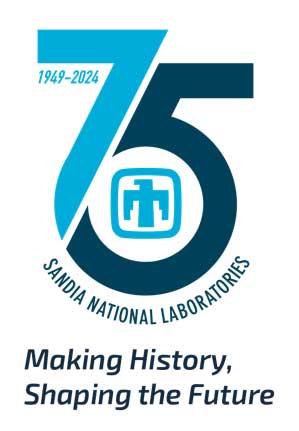
There were exceptions of course, even at the Labs, which employed a handful of women scientists. However, it wasn’t until 1972, that one of those scientists worked their way up to management.
Ruth Whan worked at the Labs for 10 years as a physicist in radiation and rad hardening before she was promoted to supervisor of the Materials Analysis Division. She was the first female to be named division supervisor, which was a level above section supervisor. Six years later, Whan would be promoted to department manager of the Chemistry and Materials Characterization Department.
Women rising to power

In 1981, Sandia California saw its first female division supervisor when Carol Verity was named supervisor of the Benefits, Medical and EEO Division. The following year, Joan Woodard was promoted to supervisor of the Solar Programs Division, also based in Livermore.
Woodard moved to Albuquerque in 1988. Two years later, she would become the first woman in a center director role when she was named director of Environmental and Manufacturing R&D Programs.
“Joan pushed hard to elevate women in the workforce and in management,” Labs historian Rebecca Ullrich said. “Dori Ellis, who came up behind Joan in management, was also a big advocate.”
Together, Woodard and Ellis focused their efforts on improving working conditions for women at Sandia as well as recruiting women engineers to join the Labs.
In 1999, Woodard made history again after she became the first female executive vice president of the Labs, a role now known as associate Labs director.
Women in Technical Management Project
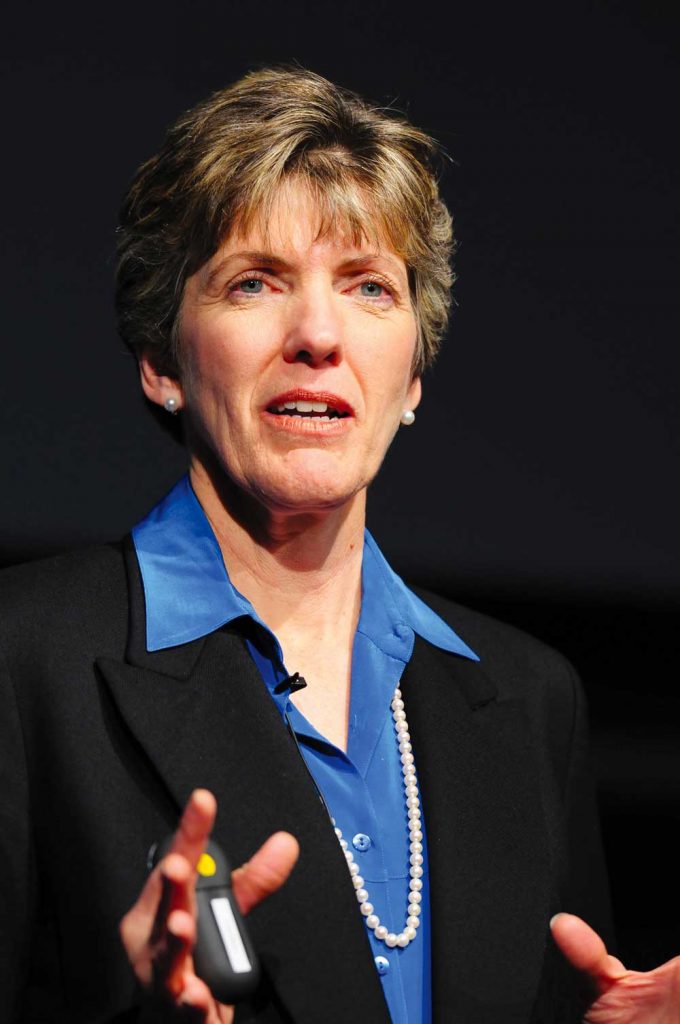
As more women were promoted, the voices calling out issues that women were facing grew louder.
“Something is going on, making it difficult for many women to be successful in management positions,” read a Lab News article published in March 2000 .
The article focused on the findings of the Women in Technical Management Project, an initiative launched two years earlier by Woodard and Ombuds Wendall Jones.
Not surprisingly, the project found that female managers who had been mentored and coached in a supportive environment were able to thrive, while those without similar support reported several problems and many would eventually step down. Women at that time were reclassified out of management at four times the rate of men.
The project also revealed that salaries of female technical managers and female technical staff were “slightly below their male counterparts.”
According to the article, Labs leadership “didn’t have a sense of the magnitude of the problem” until Woodard and the team presented the project’s findings.
These findings prompted the Labs to increase coaching and mentorship available to female managers and organize various networking workshops and conferences geared toward women in management.
In February 2010, Woodard announced her retirement. In a Lab News article celebrating her career , she spoke of the Labs efforts to improve conditions for working women, specifically policies that support working mothers. Of particular concern were child care, increased time off after childbirth, and accommodating part-time hours and telecommuting as alternatives for mothers.
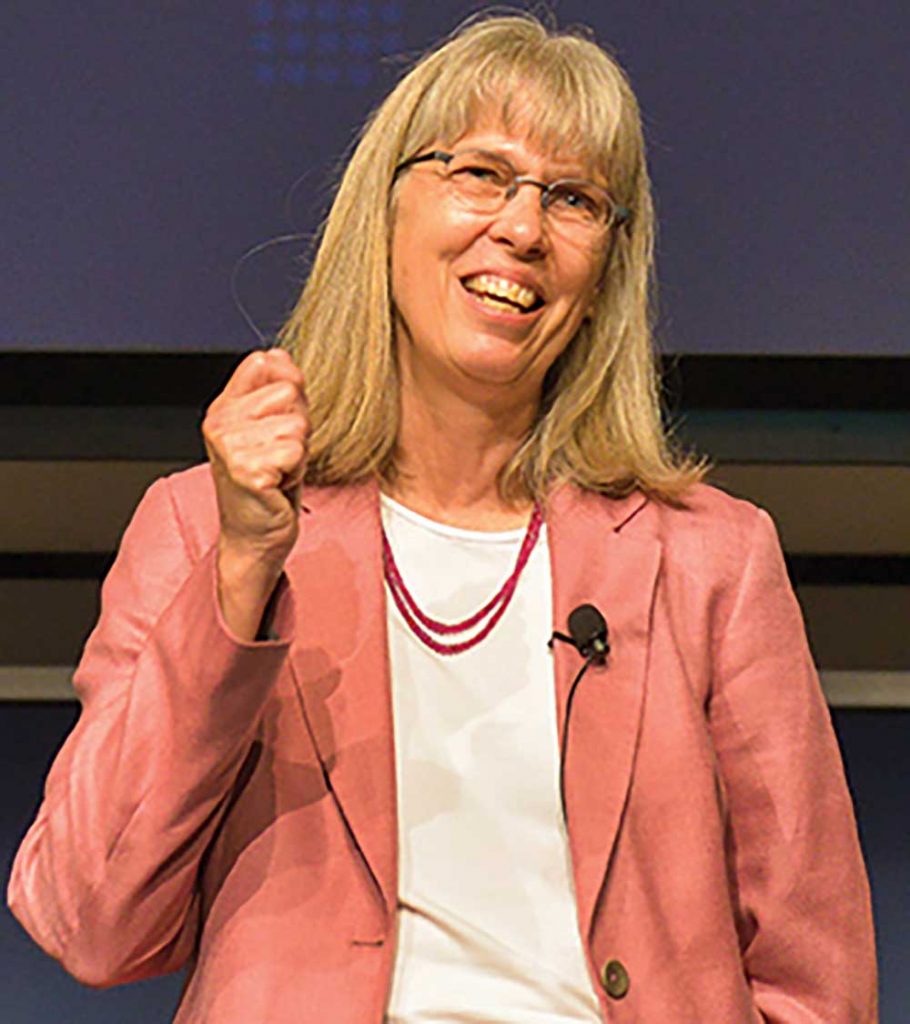
Woodard also raised the importance of having women in management as it “helps provide alternative viewpoints in solving problems and an understanding ear to the problems of women and minorities.”
Sandia’s first female Labs director
Five years after Woodard retired, Jill Hruby would make history as the first woman to be named Labs director, as well as the first woman ever to head a U.S. nuclear weapons lab.
During a news conference with local media, Jill told reporters, “Sandia started on this path a long time ago. The Labs has long welcomed diversity and inclusion and has been a leader in hiring and developing diverse talent. That paid off for Sandia being the first to hire a female director. I am thankful to the leaders who gave me a chance.”
The women in charge of weapons
In 2022, Rebecca was watching a nuclear deterrence all hands meeting. “I was multitasking, emailing, doing whatever else at the same time, and suddenly I noticed it was three women on stage,” Rebecca said.
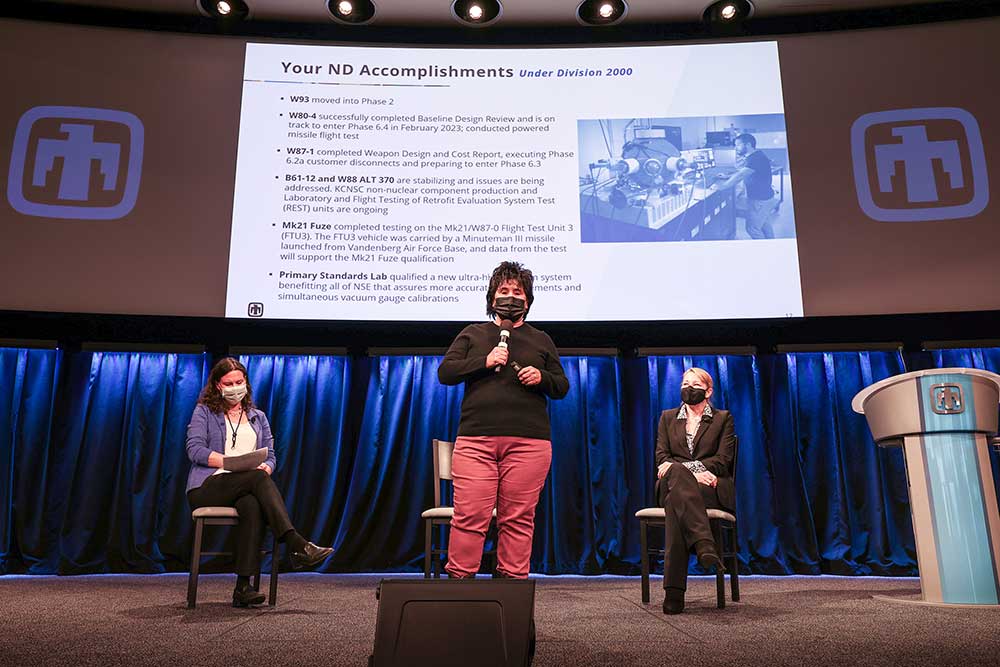
Rebecca has been at the Labs since 1994, working through an evolving landscape of women in the workforce. Through ups and downs, steps forward and steps back, the work is far from complete, but what Rebecca saw on stage stopped her in her tracks.
“I’m looking at my screen and see Michelle Stevens, who was standing in for Steve Girrens; Rita Gonzales; and Laura McGill on stage and I had to take a screenshot,” Rebecca said. “I’m thinking to myself, ‘Whoa. It’s all women in charge of weapons.’ It was just so striking in that moment. It felt huge.
“When you think of women as blondes or brunettes, you may not be able to see past that to their technical capabilities, but what I saw on that stage was proof of how far we’ve come, and I think it takes us to a place today where there is strong encouragement for moving forward.”
- Building a family their own way
- Living, racing and inspiring with Type 1
- Building effective leaders from the ground up

Career Opportunity
General laborer supervisor i - citywide (7215) - (w00001).
Recruitment: REF41360P
Published: May 17, 2024
Apply using SmartRecruiters, the City and County of San Francisco's application portal Learn More
THIS IS A CITYWIDE EXAM
San Francisco is a vibrant and dynamic city, on the forefront of economic growth & innovation, urban development, arts & entertainment, as well as social issues & change. This rich tapestry of culture and ideas is sustained by our City's commitment to heighten the quality of life for the diverse population of San Franciscans and residents of the greater Bay Area. Our employees play an important role not only in making our City what it is today, but also in shaping the future of San Francisco.
Specific information regarding this recruitment process is listed below.
Application Opening: Friday, May 17, 2024 Application Deadline: Apply Immediately. Application filing will be open at least through Monday, June 3, 2024, and will close any time thereafter. Salary range: $81,952.00 - $99,580.00 Recruitment ID: CBT-7215-W00001
Role description
Important and Essential Duties : As a General Laborer Supervisor I, your duties may include but are not limited to the following:
- You will supervise General Laborers by planning, assigning, monitoring, and evaluating work.
- Create daily assignments of laborers, sweeping and cleaning crews, and vehicle operators.
- Operate motor vehicles for the transportation of personnel and materials to job sites.
- Supervise and/or participate in sidewalk and street cleaning, sweeping, and pressure washing.
- Assure that all tools, equipment, and supplies necessary to specific jobs are available to work crews.
- Prepare written reports and records including accident/injury reports, daily work reports, attendance records, and other reports/correspondence.
- Perform mathematical calculations to determine area, costs, hours, etc.
- Supervise and/or participate in removing graffiti from walls, buildings, etc.
- Supervise and/or participate in operating forklifts, boom and scissor lifts, pressure washers, steam cleaners, suction sweepers, and sidewalk sweepers.
- Supervise and/or participate in the loading and unloading of debris (from street and sidewalk cleaning), materials, and equipment on trucks.
- Supervise and/or participate in the removal and cleanup of debris resulting from construction, wrecking, or repair work around grounds, sidewalks, and building areas; includes cleaning up illegal dumping sites.
- Train and enforce practice of safe work procedures, use of safety equipment and PPE's (personal protective equipment), and applicable codes, laws, and ordinances.
- Supervise and/or participate in the cleaning and flushing of catch basins.
- Supervise and/or participate in clearing vegetation for fire control.
- Supervise and/or participate in the operation of pneumatic and hand tools, including jackhammers, chipping guns, and tampers, used in construction or maintenance operations (may include using a hand level).
- Supervise and/or participate in excavations for water and sewer lines, electrical conduits, and concrete forms, and other similar excavations.
- Provide support for craft workers by supervising and/or participating in manual labor tasks such as lifting and carrying materials and supplies, mixing and breaking concrete, etc.
Special Requirements: Sustained physical effort, frequently under adverse weather conditions and/or disagreeable working conditions, such as working in streets or roads, in traffic, in cold and rain, or being exposed to feces, urine, raw sewage, used syringes, toxic and hazardous materials, poison oak, poisonous snakes, and insects; confined space entry; may be required to use respirator and self-contained breathing apparatus.
How to qualify
MINIMUM QUALIFICATIONS:
Experience: Four (4) years of work experience performing the duties of a general laborer in construction.
License and Certification: Valid California driver license (must be maintained during employment).
Substitution : Experience in City and County of San Francisco Class 7514 General Laborer may substitute for the required experience on a year for year basis.
Note: One-year full-time employment is considered equivalent to 2000 hours (2000 hours of qualifying work experience is based on a 40-hour work week). Any overtime hours that you work above forty (40) hours per week are not included in the calculation to determine full-time employment.
Please make sure your application is complete and demonstrates how you meet the minimum qualifications. Applicants may be required to submit verification of qualifying education and experience at any point during the recruitment and selection process. If education verification is required, information on how to verify education requirements, including verifying foreign education credits or degree equivalency, can be found at How to Verify Education Requirements ( https://sfdhr.org/node/765 ).
Note: Falsifying one’s education, training, or work experience or attempted deception on the application may result in disqualification for this and future job opportunities with the City and County of San Francisco.
Verification:
All work experience, education, training and other information substantiating how you meet the minimum qualifications must be included on your application by the filing deadline. Information submitted after the filing deadline will not be considered in determining whether you meet the minimum qualifications.
Resumes will not be accepted in lieu of a completed City and County of San Francisco application.
Applications completed improperly may be cause for ineligibility, disqualification or may lead to lower scores.
What else should I know?
SELECTION PROCEDURE/EXAMINATION REQUIREMENTS After application submission, candidates deemed qualified must complete all subsequent steps to advance in this selection process, which includes the following:
Minimum Qualification Supplemental Questionnaire (MQSQ) (Weight: Qualifying): Candidates will be required to complete a MQSQ as part of the employment application. This MQSQ is designed to obtain specific information regarding an applicant's experience in relation to the Minimum Qualifications (MQ) for this position. The MQSQ will be used to evaluate if the applicant possesses the required minimum qualifications.
Trades Supervisory Written Examination (Weight 50%): Candidates will be administered a written multiple-choice examination that incudes test items that relate to various supervisory practices and procedures (e.g., directing subordinates, delegating tasks to subordinates, providing customer service, demonstrating appropriate supervisory/leadership behavior, addressing and/or evaluating subordinate issues, behavior and performance, etc.) and well as reading comprehension items.
This is a standardized examination and, therefore, test questions and test answers are not available for public inspection or review.
The score you achieve on this examination shall be valid and 'banked' for three years, starting from the date of the examination. This means that, during this three-year time period, you will not be required to take this test again should you apply and be found eligible for a future announcement for which this particular test is used. Please note this test is used for other supervisory classes therefore your test score may be applied to one or more of these classes if you choose to apply to future recruitments. If the test for this future announcement is held within one year of the date of this examination, your score will be automatically applied to that announcement. However, after one year, you have the option to either (a) apply your test score to the other announcement or (b) re-take the test. Re-testing is permitted no sooner than one year from the date of the examination and only in association with your eligibility for another announcement for which this test is used. Please note that, should you re-test, your re-test score would become your official score since it is the most recent.
Written Examination (Weight 50%): Candidates achieving a passing score on the Trades Supervisory Written Examination will be invited to participate in a written examination designed to measure their relative knowledge, skills and abilities in job-related areas, which may include, but not be limited to knowledge of: safe work practices, general labor procedures, pneumatic and hand tools, other tools, and applicable codes, laws and ordinances; ability and/or skill to: communicate clearly and effectively with others, prepare reports and correspondence, promote and maintain good working relationships, deal courteously with others, and use a variety of hand and pneumatic tools and other equipment.
Note : Candidates must achieve a passing score on each exam in the selection procedure to be ranked on the eligible list.
Eligible List/Score Report: A confidential eligible list of applicant names that have passed the civil service examination process will be created and used for certification purposes only. An examination score report will be established, so applicants can view the ranks, final scores, and number of eligible candidates. Applicant information, including names of applicants on the eligible list, shall not be made public unless required by law. However, an eligible list shall be made available for public inspection, upon request, once the eligible list is exhausted or expired and referrals resolved. The eligible list/score report resulting from this civil service examination process is subject to change after adoption (e.g., as a result of appeals), as directed by the Human Resources Director or the Civil Service Commission.
Once you pass the exam, you will be placed on an eligible list and given a score and a rank. For more information, visit https://careers.sf.gov/knowledge/process/ . The duration of the eligible list will be twelve (12) months and may be extended with the approval of the Human Resources Director.
Certification Rule: The certification rule for the eligible list resulting from this exam will be Rule of 3 Scores . Additional selection processes may be conducted by the hiring department prior to making final hiring decisions.
How to apply:
Applications for City and County of San Francisco jobs are only accepted through an online process. Visit careers.sf.gov and begin the application process.
Our e-mail communications may come from more than one department so please make sure your email is set to accept messages from all of us at https://sfdhr.org/ccsf-email-extensions.
Applicants may be contacted by email about this recruitment therefore, it is the responsibility of the applicant to contact the Analyst if they update their email address.
Applicants will get a confirmation email acknowledging the receipt of their online application for each filed announcement. It's essential to keep this email for records. Failure to receive this email means that the online application was not submitted or received.
Terms of Announcement and Appeal Rights Applicants must be guided solely by the provisions of this announcement, including requirements, time periods and other particulars, except when superseded by federal, state or local laws, rules or regulations. Note: The correction of clerical errors in an announcement may be posted on the Department of Human Resources website at https://careers.sf.gov ]. The terms of this announcement may be appealed under Civil Service Rule 110.4. Such appeals must be submitted in writing to the Department of Human Resources, 1 S Van Ness Avenue, 4th Floor, San Francisco, CA 94103-5413 by close of business on the 5th business day following the issuance date of this examination announcement. Information concerning other Civil Service Commission Rules involving announcements, applications and examination policies, including applicant appeal rights, can be found on the Civil Service Commission website https://www.sf.gov/departments/civil-service-commission .
Drug Testing Requirement: Applicants for positions in this classification who are not currently employed by the City and County of San Francisco in a safety-sensitive position represented by the Laborers, Local 261, are required to pass pre-employment drug and alcohol testing. All employees in this classification may also be subject to drug and alcohol testing upon reasonable suspicion or after a work-related accident. Applicants with a positive result from a pre-employment drug test will be restricted from hire in safety-sensitive positions for six months after the date of the positive test.
Additional Information Regarding Employment with the City and County of San Francisco:
- Information About the Hiring Process
- Conviction History
- Employee Benefits Overview
- Equal Employment Opportunity
- Disaster Service Worker
- ADA Accommodation
- Veterans Preference
- Seniority Credit in Promotional Exams
- Right to Work
- Copies of Application Documents
- Diversity Statement
Statement on Diversity, Equity, and Inclusion: At the City and County of San Francisco, we share a commitment to a diverse, inclusive and equitable community. Each member of our organization is responsible and accountable for what they say and do to make San Francisco an inclusive and equitable place to live and work by employing fair and just practices to and for all.
If you have any questions regarding this recruitment or application process, please contact Tara Stevens by email at [email protected]
The City and County of San Francisco encourages women, minorities and persons with disabilities to apply. Applicants will be considered regardless of their sex, race, age, religion, color, national origin, ancestry, physical disability, mental disability, medical condition (associated with cancer, a history of cancer, or genetic characteristics), HIV/AIDS status, genetic information, marital status, sexual orientation, gender, gender identity, gender expression, military and veteran status, or other protected category under the law.

COMMENTS
4. Is a Good Mentor with a Supportive Personality. A good PhD supervisor should be supportive and willing to listen. A PhD project is an exercise in independently producing a substantial body of research work; the primary role of your supervisor should be to provide mentoring to help you achieve this.
Your PhD supervisor will play a vital role in your doctorate, supporting you from starting out to thesis submission (and beyond). ... You might occasionally see different terms to refer to a PhD supervisor, such as dissertation advisor, thesis advisor or doctoral supervisor. Most of the time, these will all refer to the same person (the ...
PhD supervision: roles and responsibilities Image: ommunity https://flic.kr/p/akHupi CC BY 2.0 This guidance is designed to support your developing practice in PhD supervision within the LSE context. If you would like to discuss any aspect of this guidance further or if you have any
The role of a supervisor is threefold: to advise graduate students, monitor their academic progress, and act as a mentor. ... supervising PhD students reflects a longer-term, more substantive commitment. The privilege to supervise PhD students requires that the supervisor hold Approved Doctoral Dissertation Supervisor (ADDS) status. The intent ...
Rule 3: Expectations, expectations, expectations. A considerable portion of PhD students feel that their program does not meet original expectations [].To avoid being part of this group, we stress the importance of aligning your expectations with the supervisor's expectations before joining a research group or PhD program.
The role of a PhD supervisor is to use their own experience and expertise to support you throughout your project. A good supervisor will show interest in your project and provide regular feedback on your work. Each person's supervision experience depends on their university, department and personal preferences. ...
However, these policies need to be accommodated into already overloaded workloads and should include regular review of supervisors. Academics. PhD. professional mentoring. PhD supervisors ...
Your PhD advisor will play a key role in ensuring your Doctor of Philosophy is a rewarding and enjoyable experience.. Choosing a PhD supervisor can therefore be a daunting prospect. But we've enlisted the help of 2 UQ PhD advisors and researchers, Dr Loic Yengo and Professor Marina Reeves, to pinpoint exactly what you should be looking for.
The relationship between PhD students and their supervisors is often said to be the most intense in the academy, with huge implications for student success. Yet most supervisors receive little if any training. ... Figuring out these roles and responsibilities can be one of the most challenging aspects of being a PhD supervisor, and seeking out ...
Fundamentals of PhD Supervision. Fundamentals of PhD Supervision is an online course that has been developed by the Institute for Academic Development in consultation with the Doctoral College and relevant staff in Colleges and Support Services. This course aims to help new supervisors develop their understanding of the role and ...
A PhD candidate is a student, and therefore worthy of respect, care, guidance and clarity in the standards of a professional relationship. 9. Create a strong supervisory team. Most university systems around the world insist on a supervisory team.
PhD supervision is associated with a variety of expectations and responsibilities, from both the student and the supervisor, but there is also not a single approach to the supervisor relationship. The importance of the PhD supervisory relationship cannot be overstated—at a minimum, it is a one-on-one relationship of close collaboration that ...
4. Keep communication open. While everyone has different styles of communicating, it's imperative that PhD students and supervisors agree on a style that suits both their needs, notes Cardilini ...
For PhD students, hold a meeting with your student's other supervisor(s) to clarify your expectations, roles, frequency of meetings and approaches. Styles of supervision. Supervisory styles are often conceptualized on a spectrum from laissez-faire to more contractual or from managerial to supportive.
Qualities of a good PhD supervisor. Wondering how to choose a PhD supervisor or what to ask a potential PhD supervisor? Here are the key roles that your supervisor can (and should) play: Bridging cultural differences. A good supervisor will do their best to make a student comfortable if they are in an unfamiliar geographical and/or cultural ...
In the previous steps, we explored the characteristics of an effective supervisor. However, besides you and the PhD candidate, PhD supervision implies the involvement of several other partners, each with their own role and their part of responsibility in the success of the PhD trajectory: the institution (or Graduate School), the other supervisor(s), the department in which the study is being ...
Supervisors play a vital role in shaping doctoral students into successful research communicators. By understanding their students' goals, providing tailored guidance, and fostering essential skills, supervisors can empower them to confidently share their research and make a significant impact on their chosen fields. Via iLovePhD.
PhD students are not trainees or employees: they need guidance and supervision, particularly during the first two years. PhD students today face more challenges than most professors ever did. The ...
The role of a supervisor. The supervisory team play an extremely important role in the postgraduate experience. They. oversee the entire research project and provide feedback throughout, as well ...
They explore that a supervisor must act in a 'developer' role, but also a 'deliverer' role. For a PhD Supervisor, this might be focusing on caring for the student and helping them cope with any personal issues that arise during the PhD journey, but also having to ensure that the student is productive and generating research outputs.
The role of the academic supervisor and the role of a business manager are, therefore, analogous. It is this analogy that will be used to offer greater insight into the activities of the supervisor, and to demonstrate that PhD supervision requires abilities and attitudes that lie outside the bounds of the subject discipline.
The study aims to create a good understanding of supervisor role in the development of PhD students skills, where the supervisor's activity is significant in his ability to reveal the research potential of PhD students so that their action would not only be of a formal (i.e., purely didactic, opportunistic) nature but would have an outlet to
Understanding the determinants of PhD student satisfaction is likely to become increasingly vital for universities as student satisfaction rankings already ubiquitous at undergraduate and master degree levels extend more broadly to the PhD level. Moreover, as PhD student populations and university competition become increasingly transnational, there is a growing need to understand cross ...
A data scientist earns an average salary of $108,659 in the United States, according to Lightcast™ [1]. Demand is high for data professionals—data scientists occupations are expected to grow by 36 percent in the next 10 years (much faster than average), according to the US Bureau of Labor Statistics (BLS) [ 2 ].
The 20 women supervisors featured in the 1958 story were section supervisors, which was the lowest level of management at the time. Of those, only two were in technical positions; the rest worked in general or administrative roles. This was on par with the times, as most women working in that era were employed in clerical, teaching and sales jobs.
Role description. Important and Essential Duties: As a General Laborer Supervisor I, your duties may include but are not limited to the following: You will supervise General Laborers by planning, assigning, monitoring, and evaluating work. Create daily assignments of laborers, sweeping and cleaning crews, and vehicle operators.